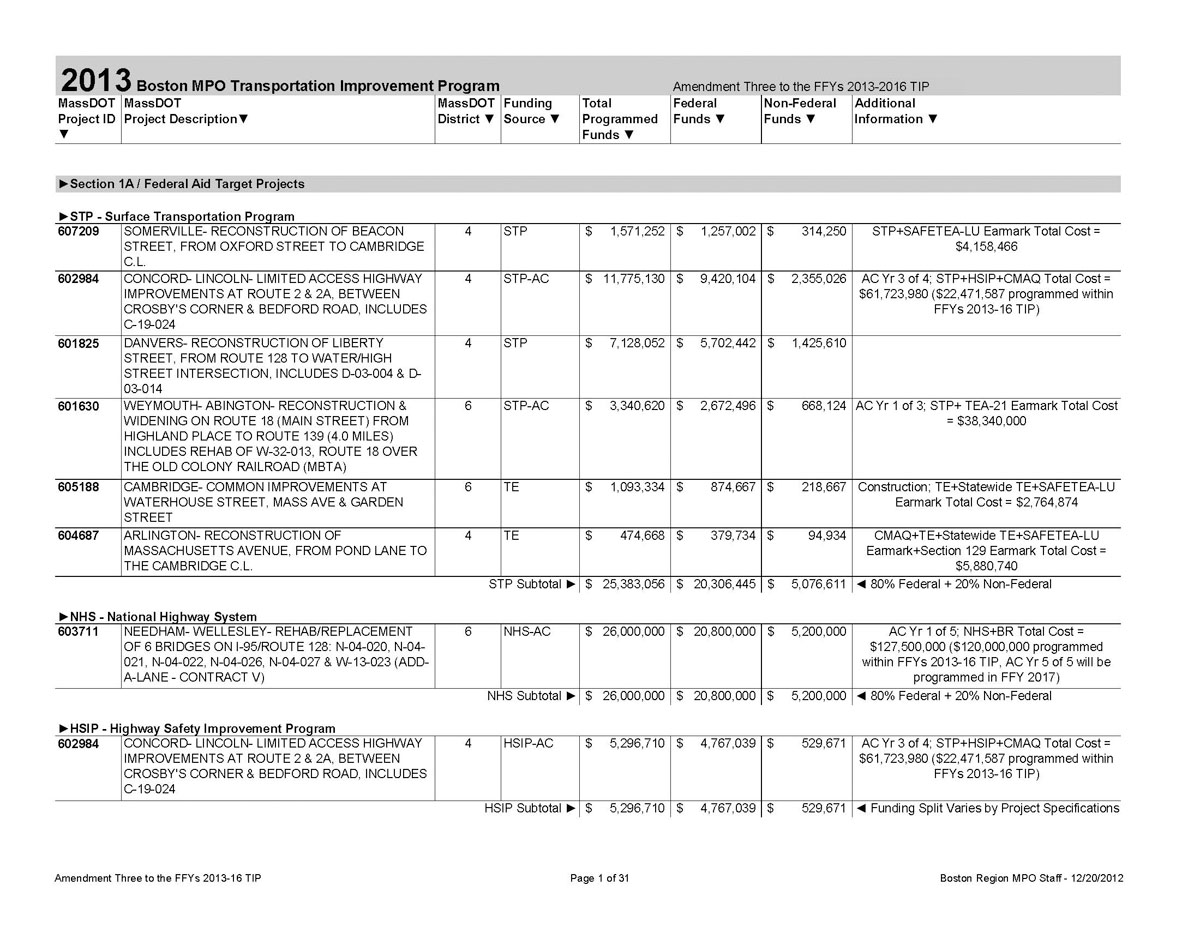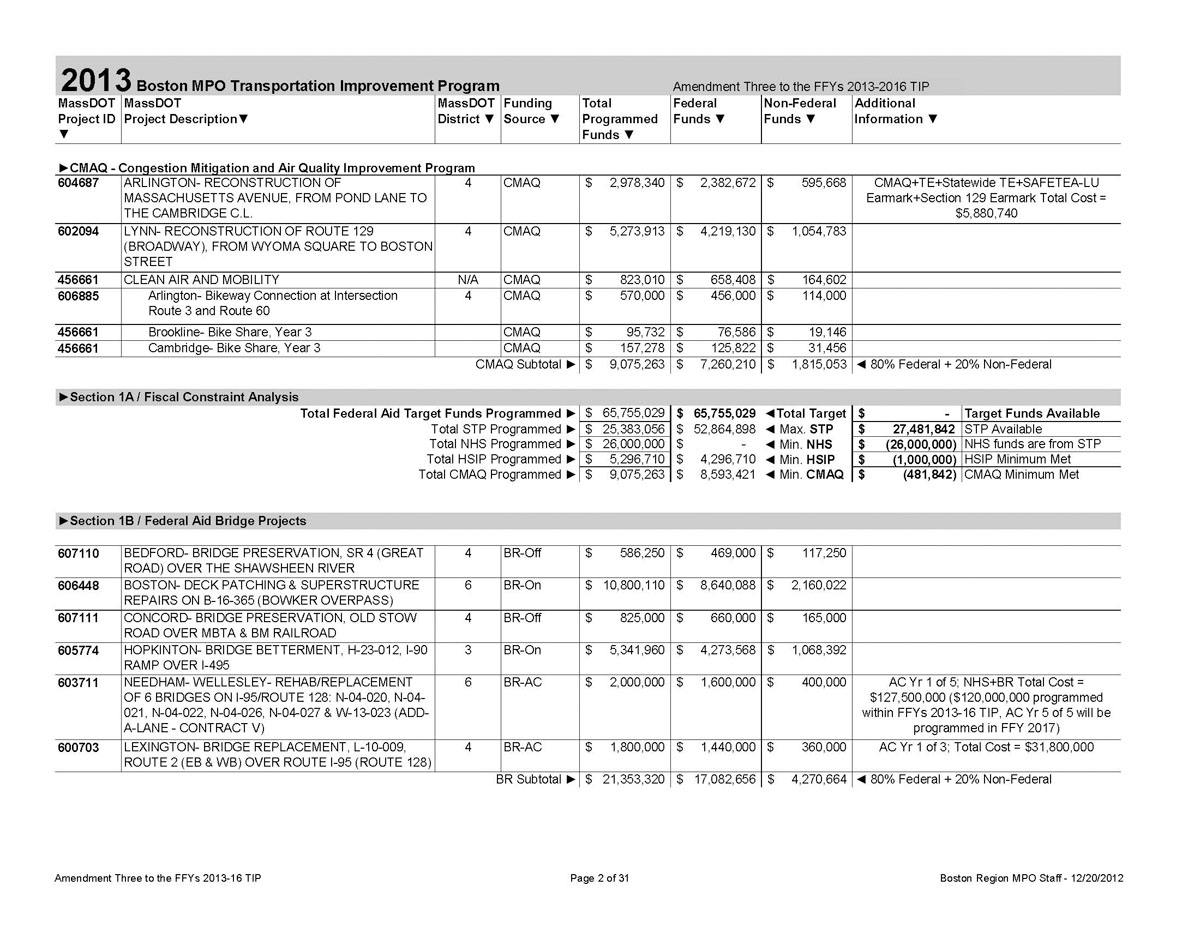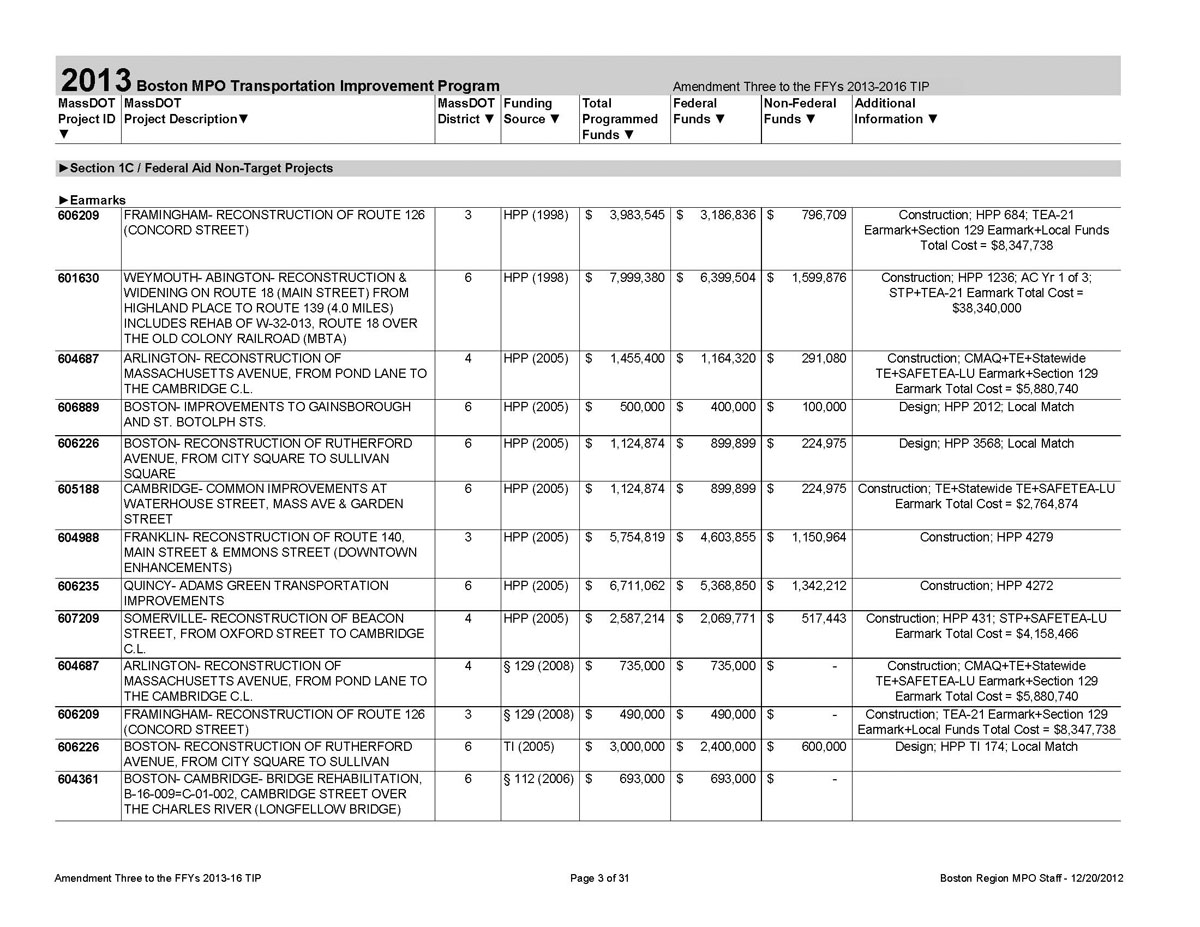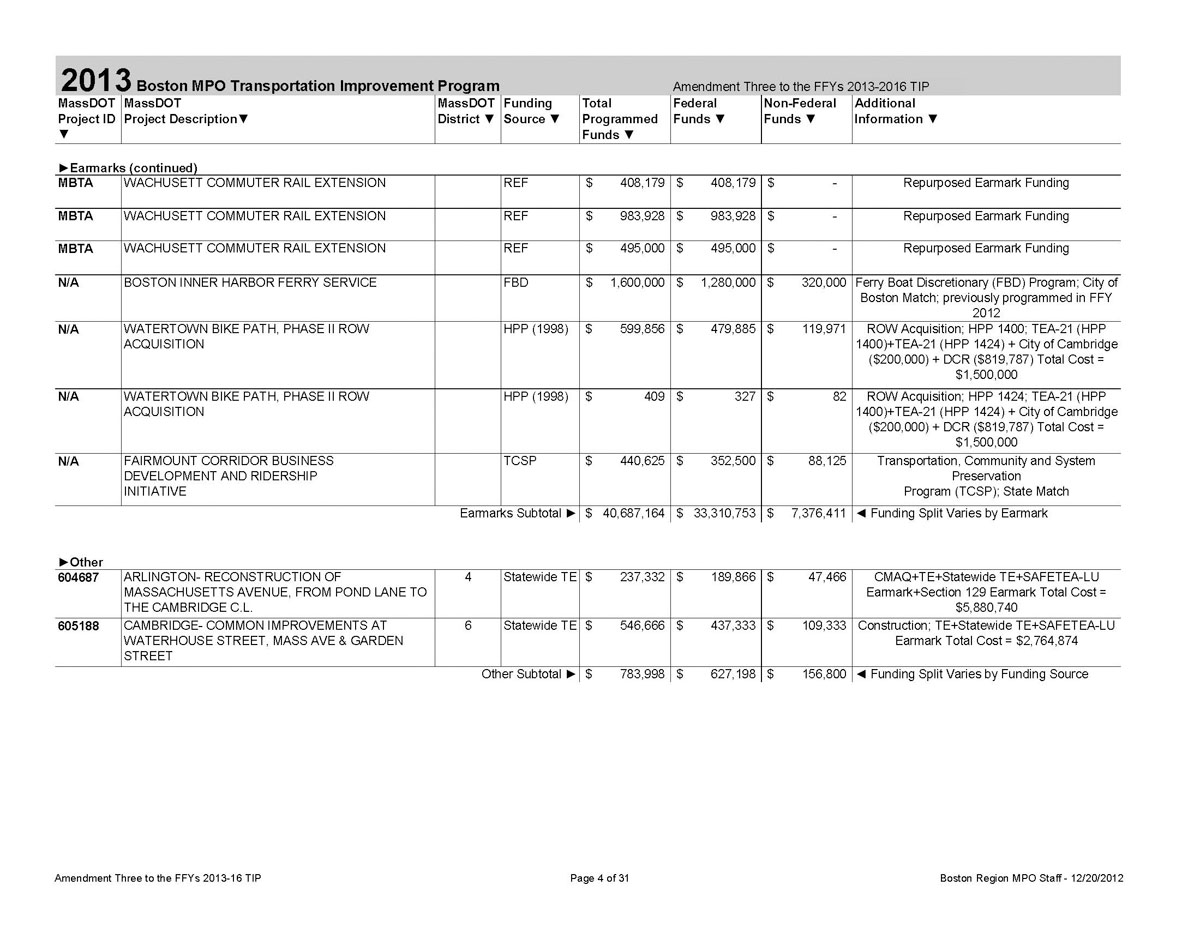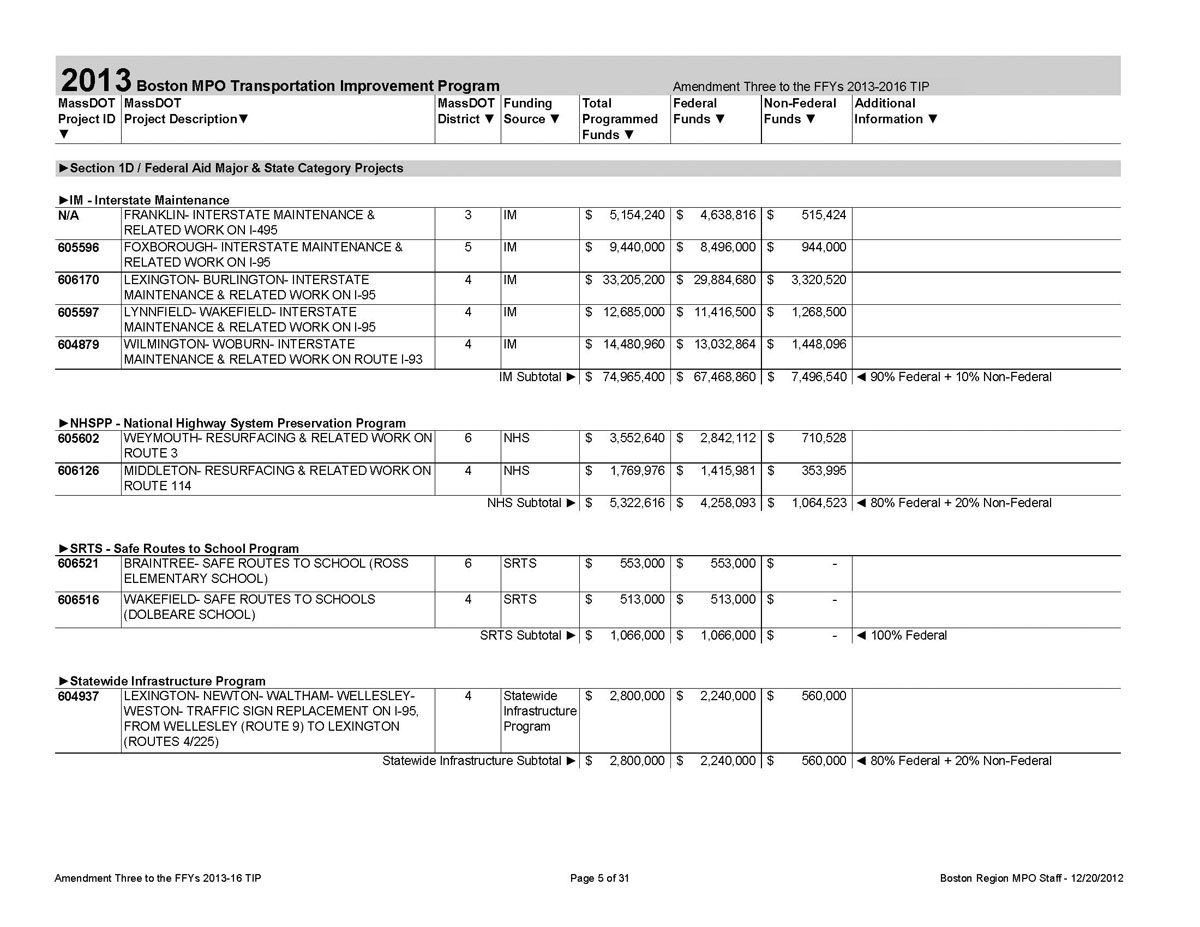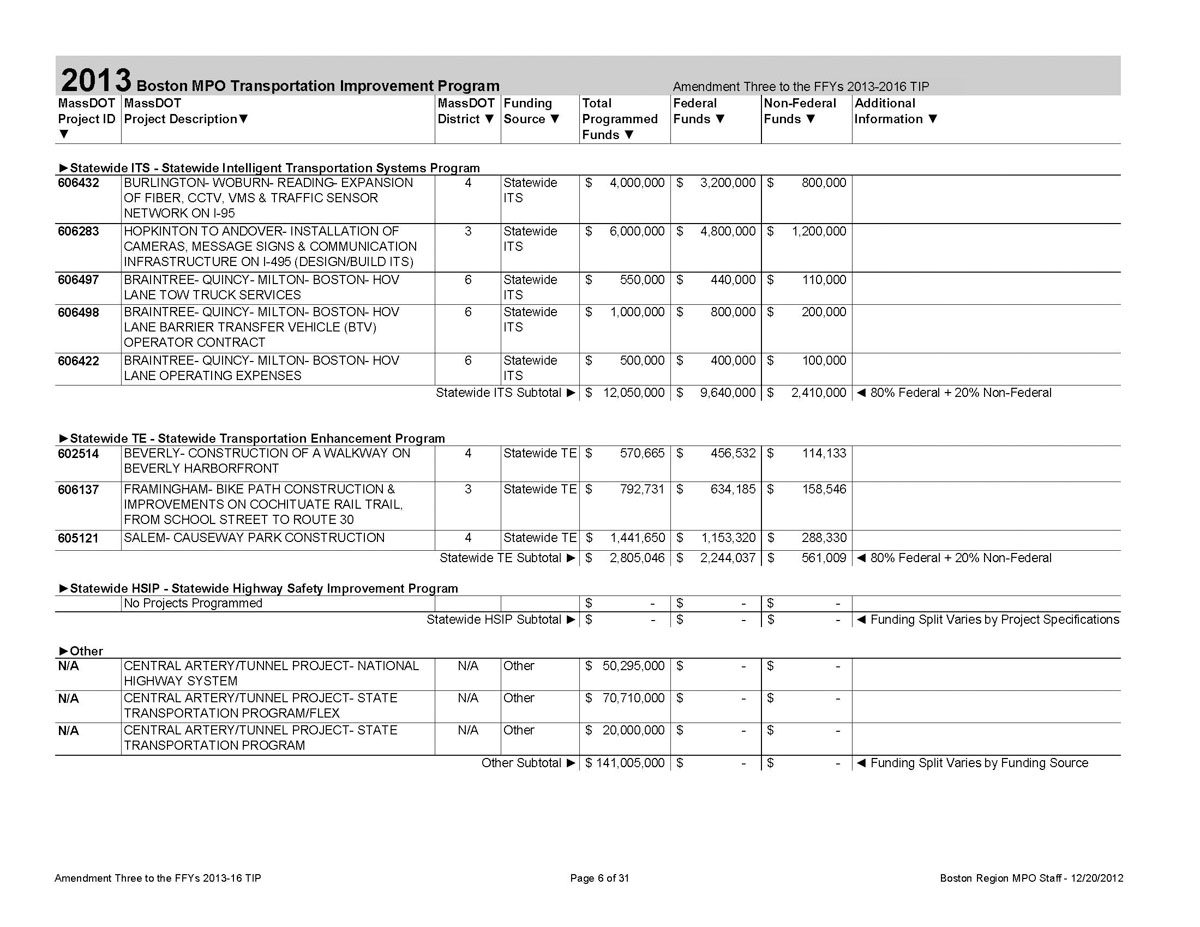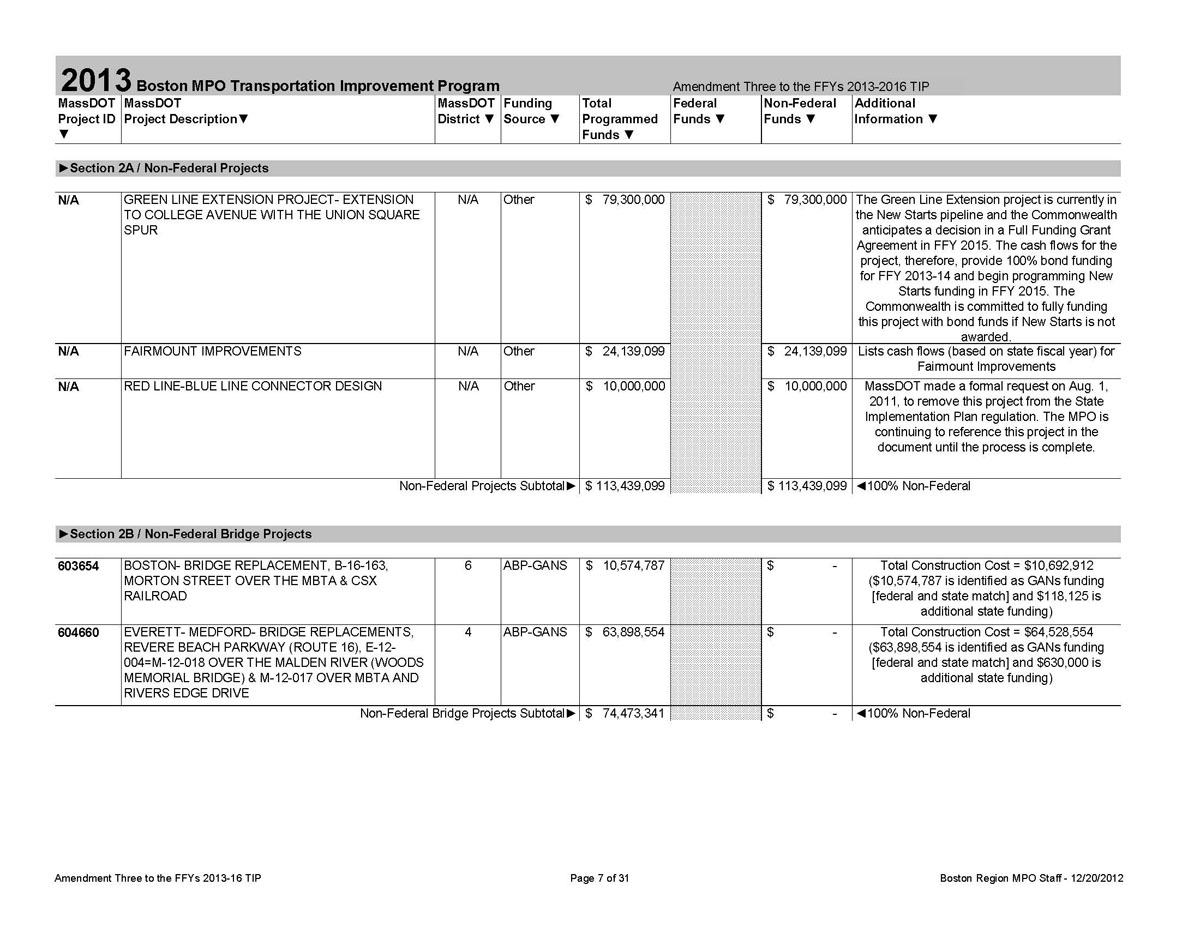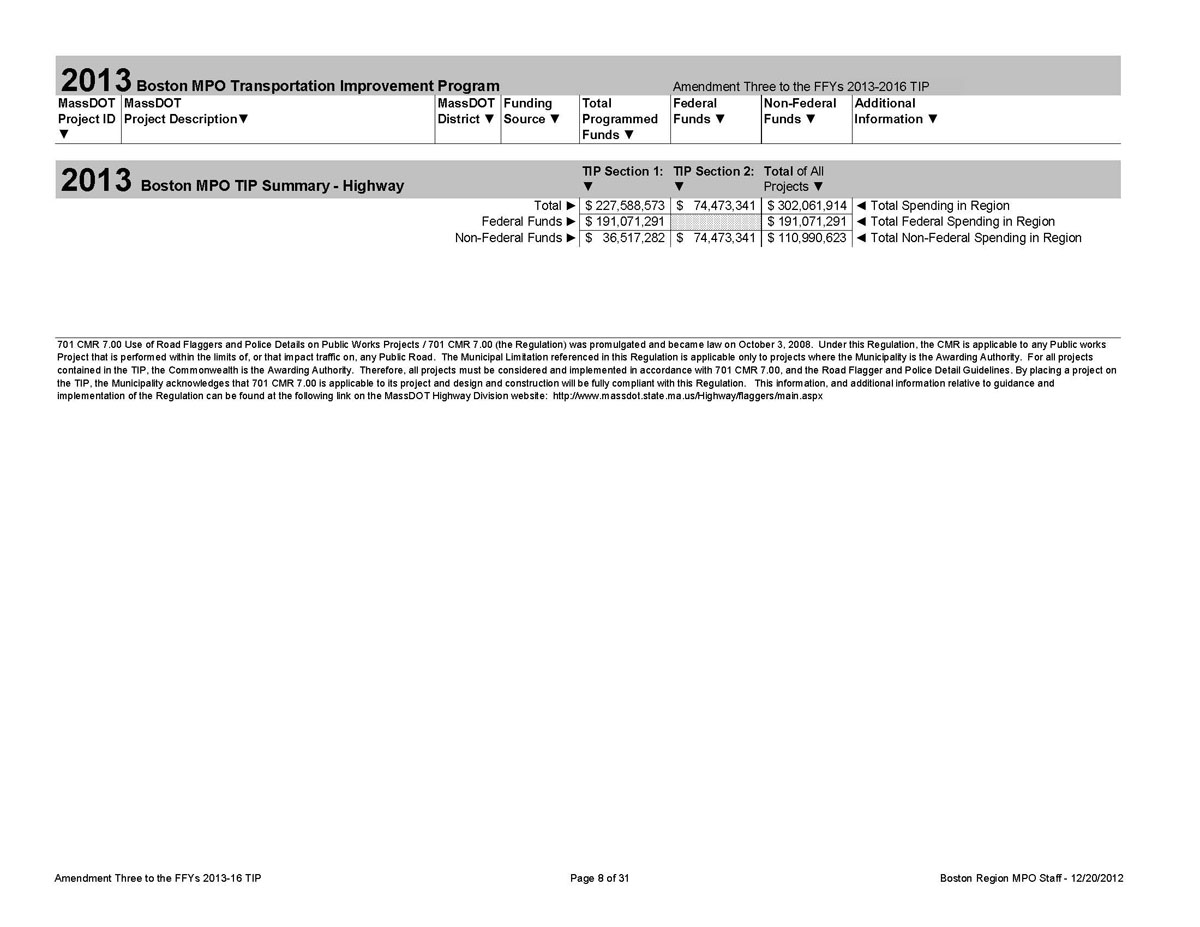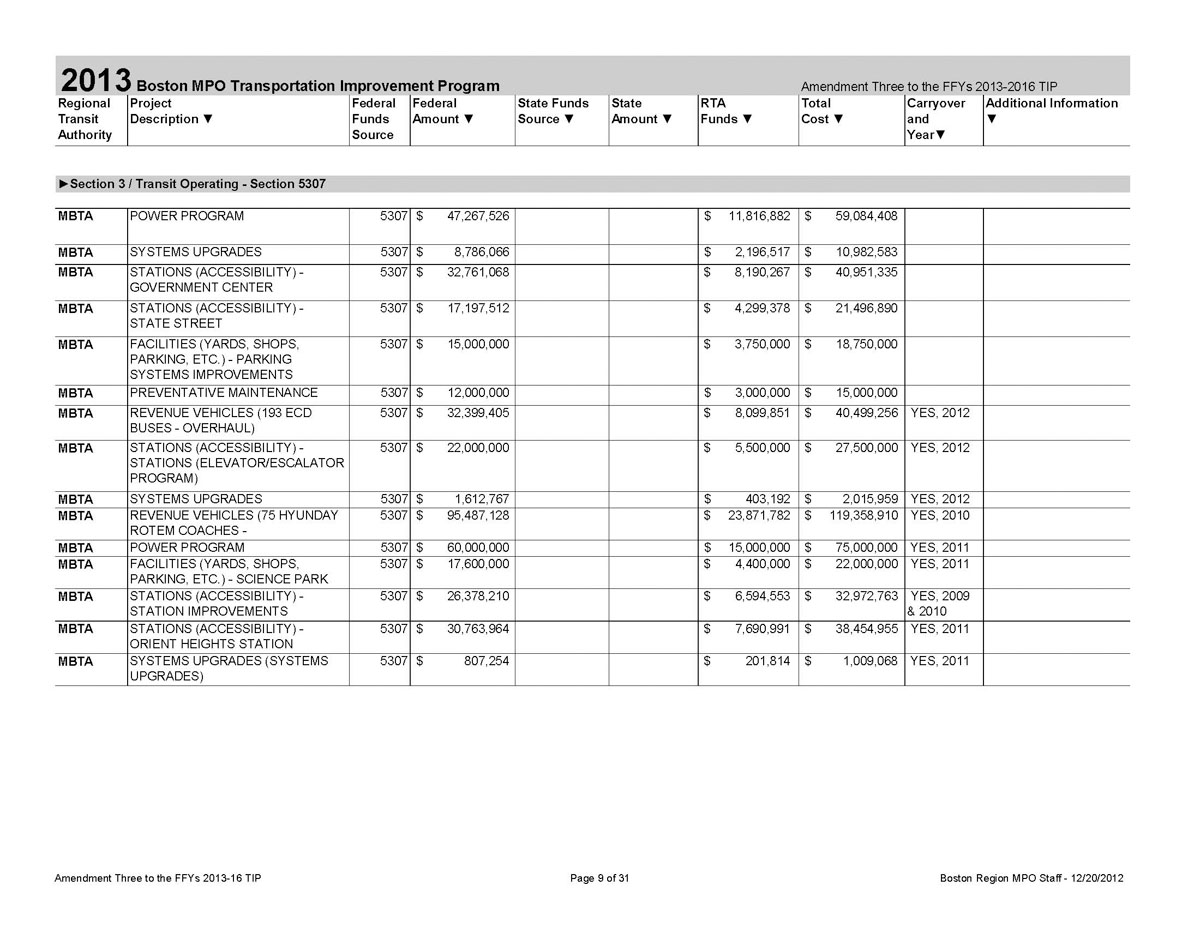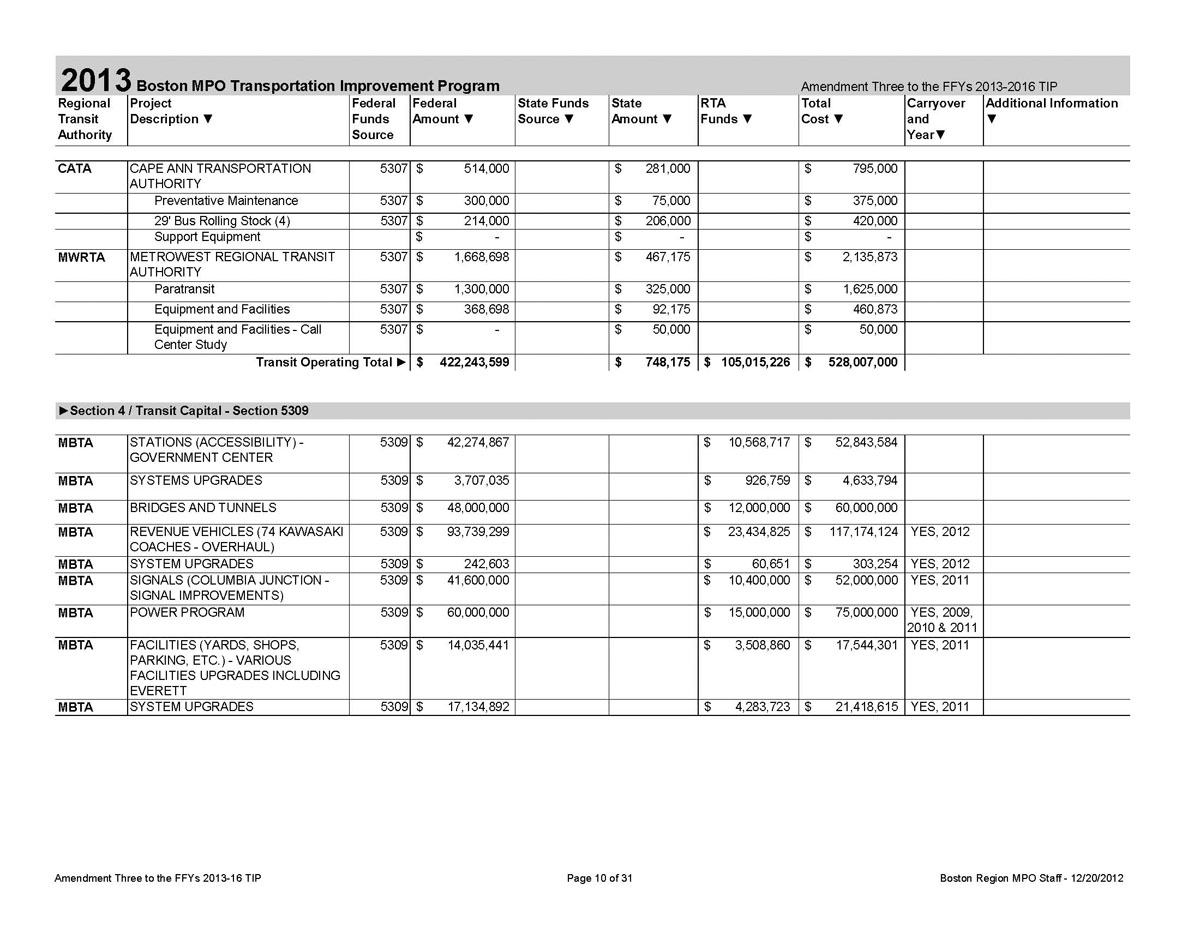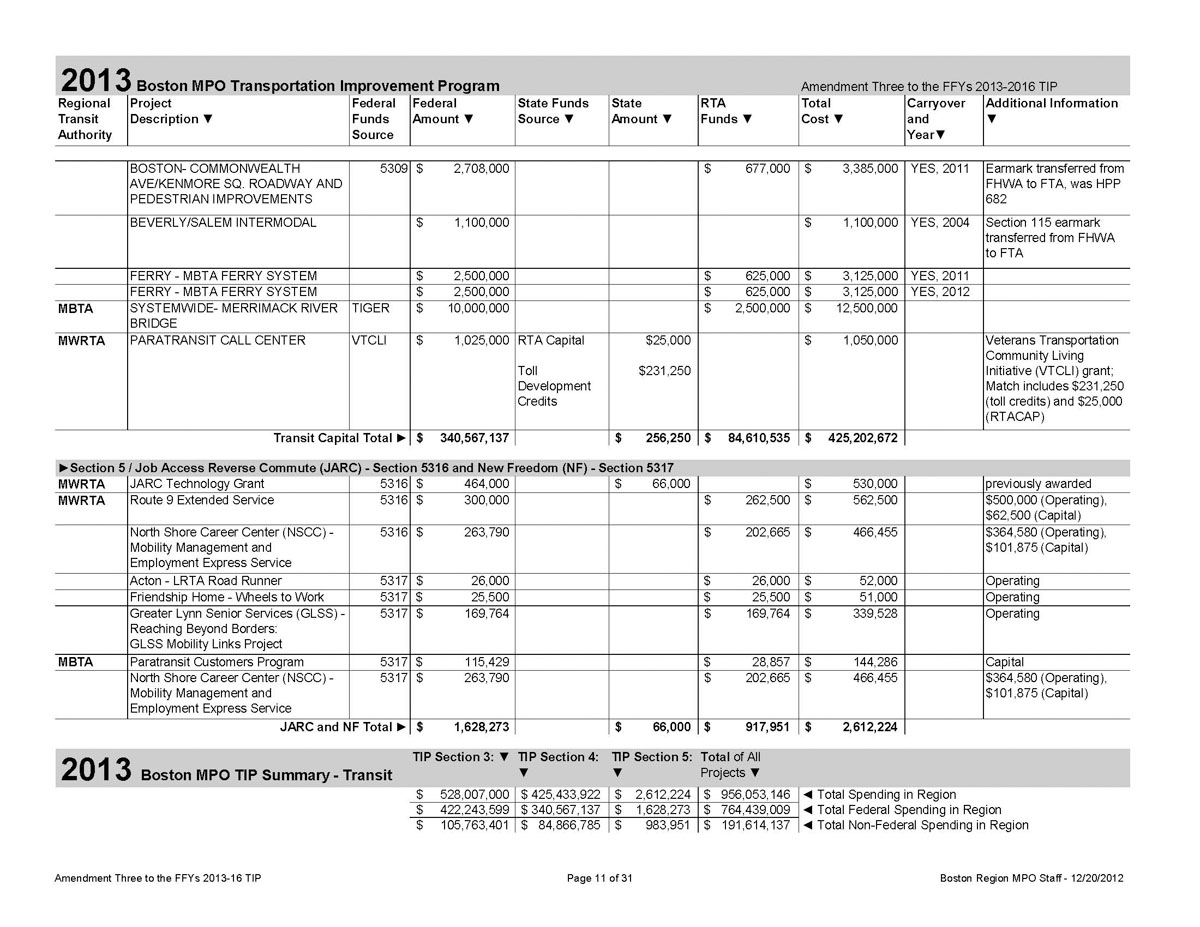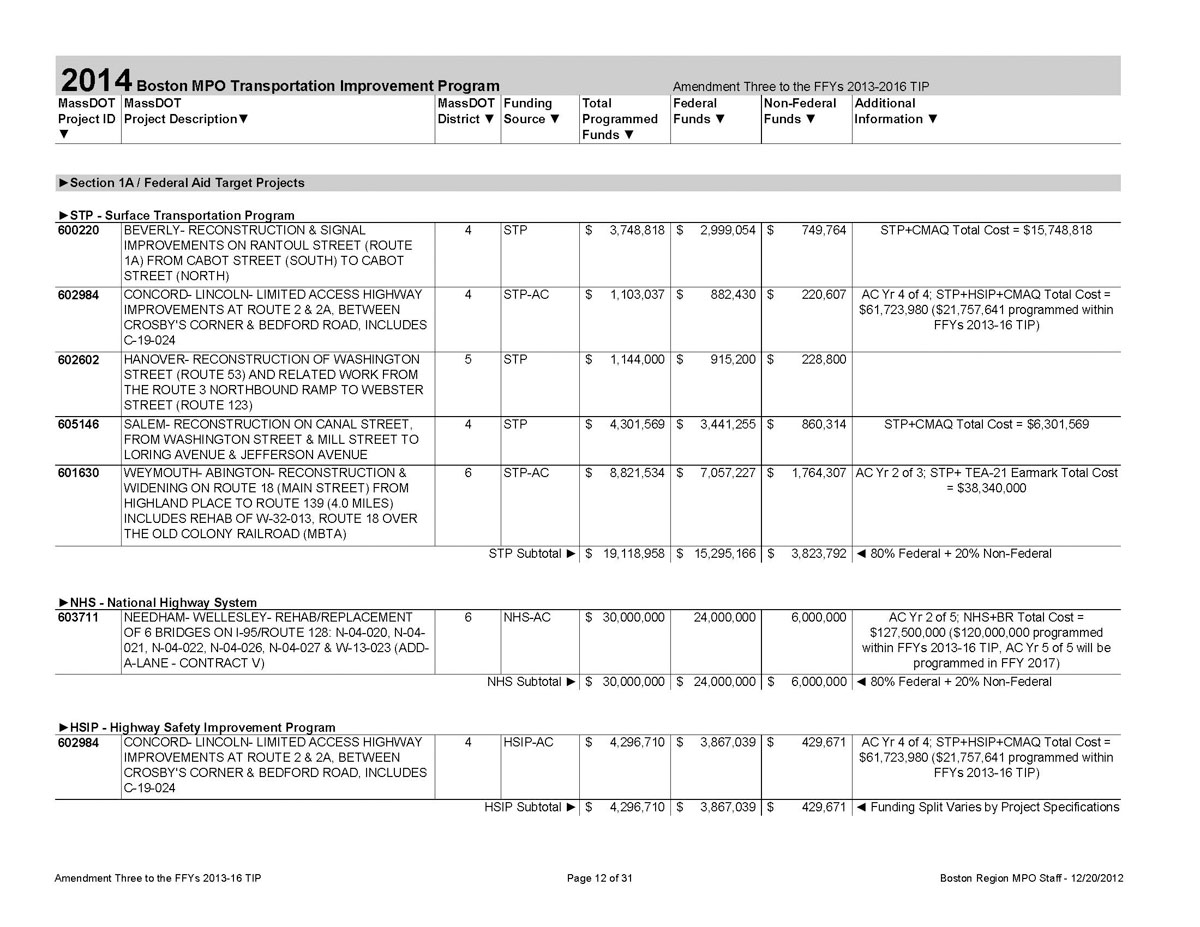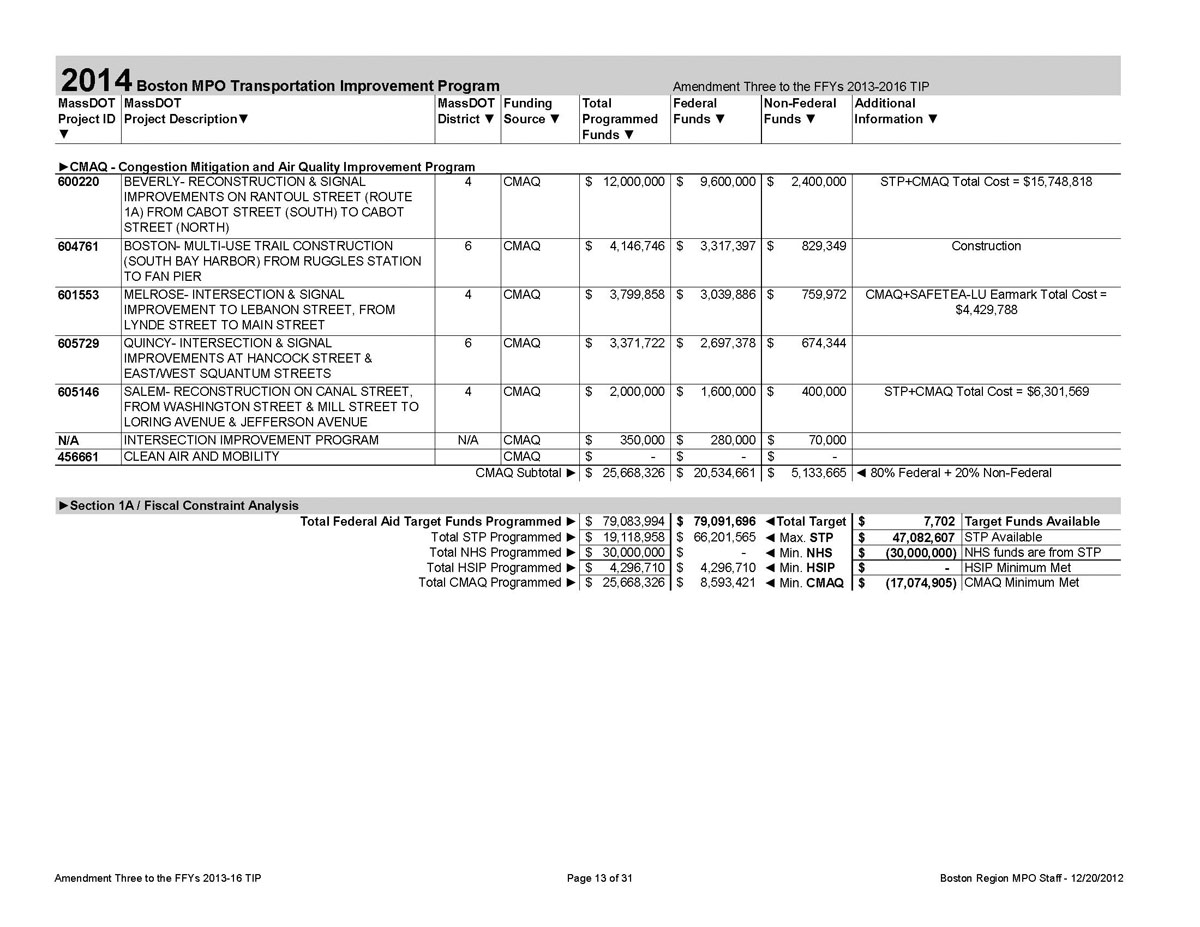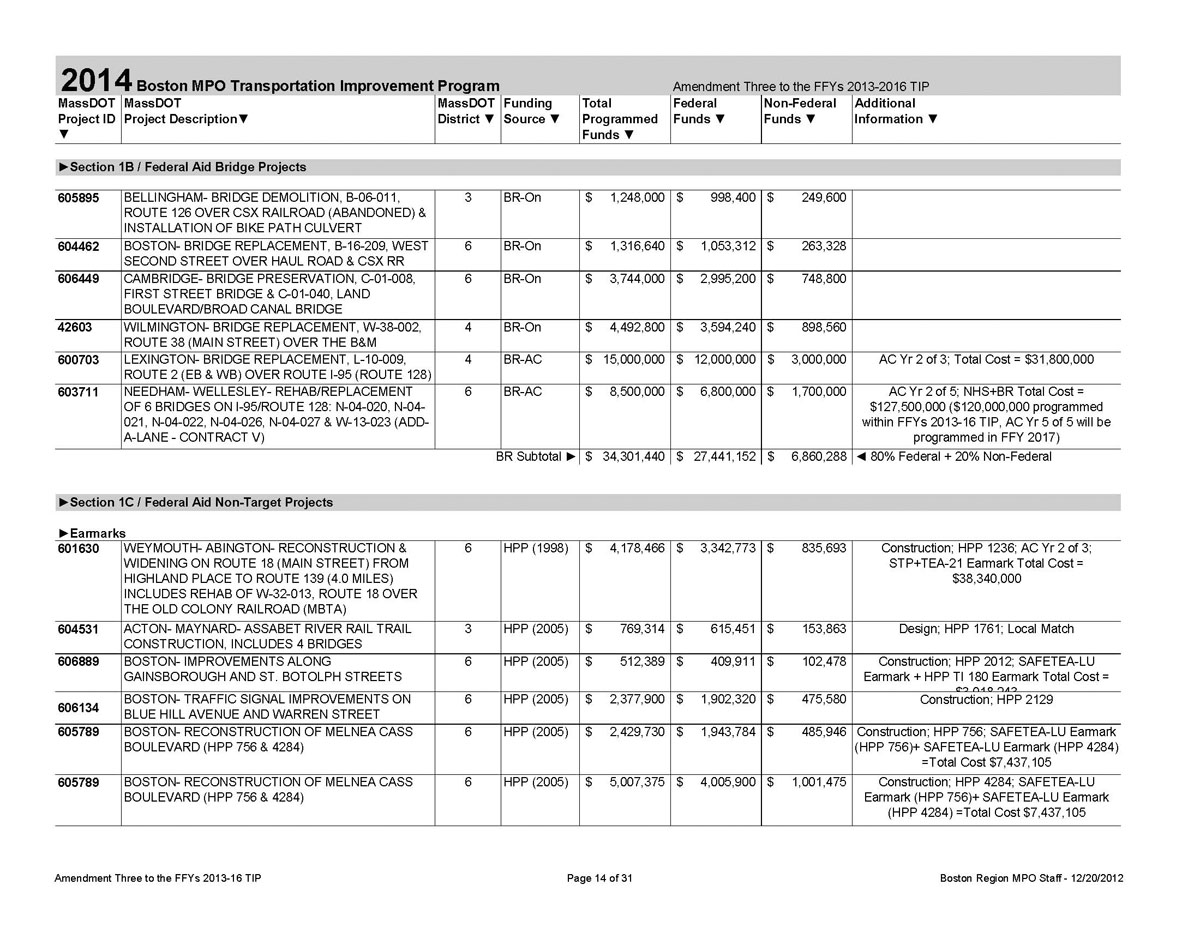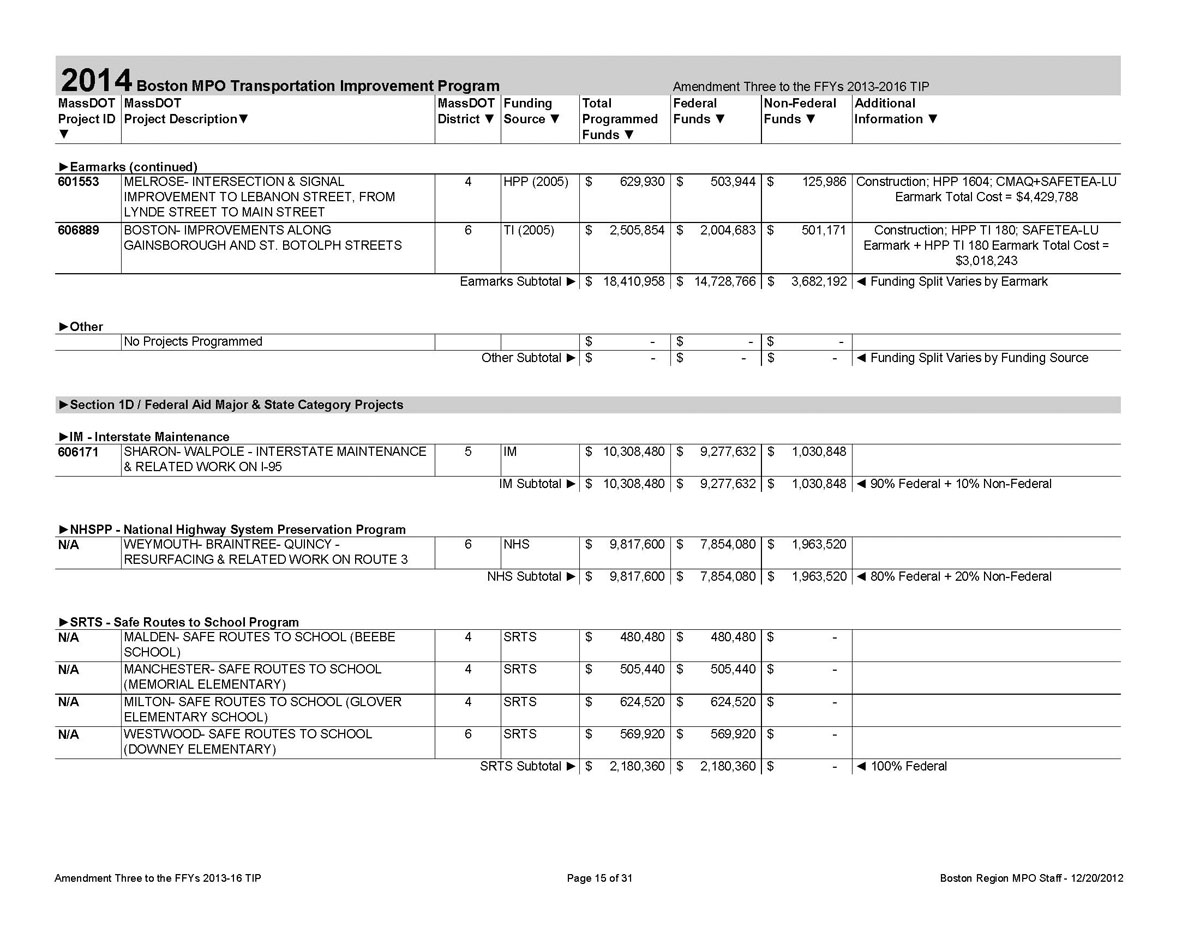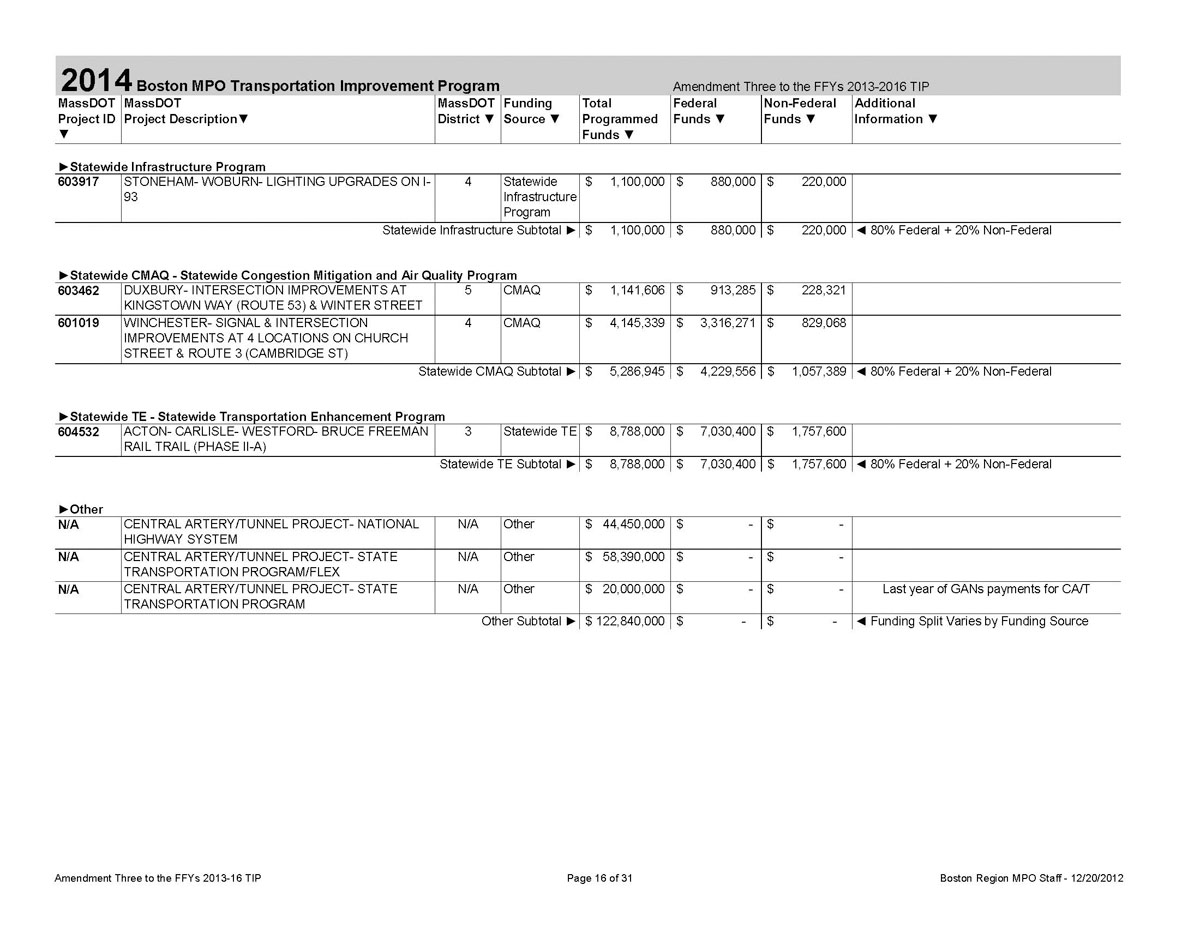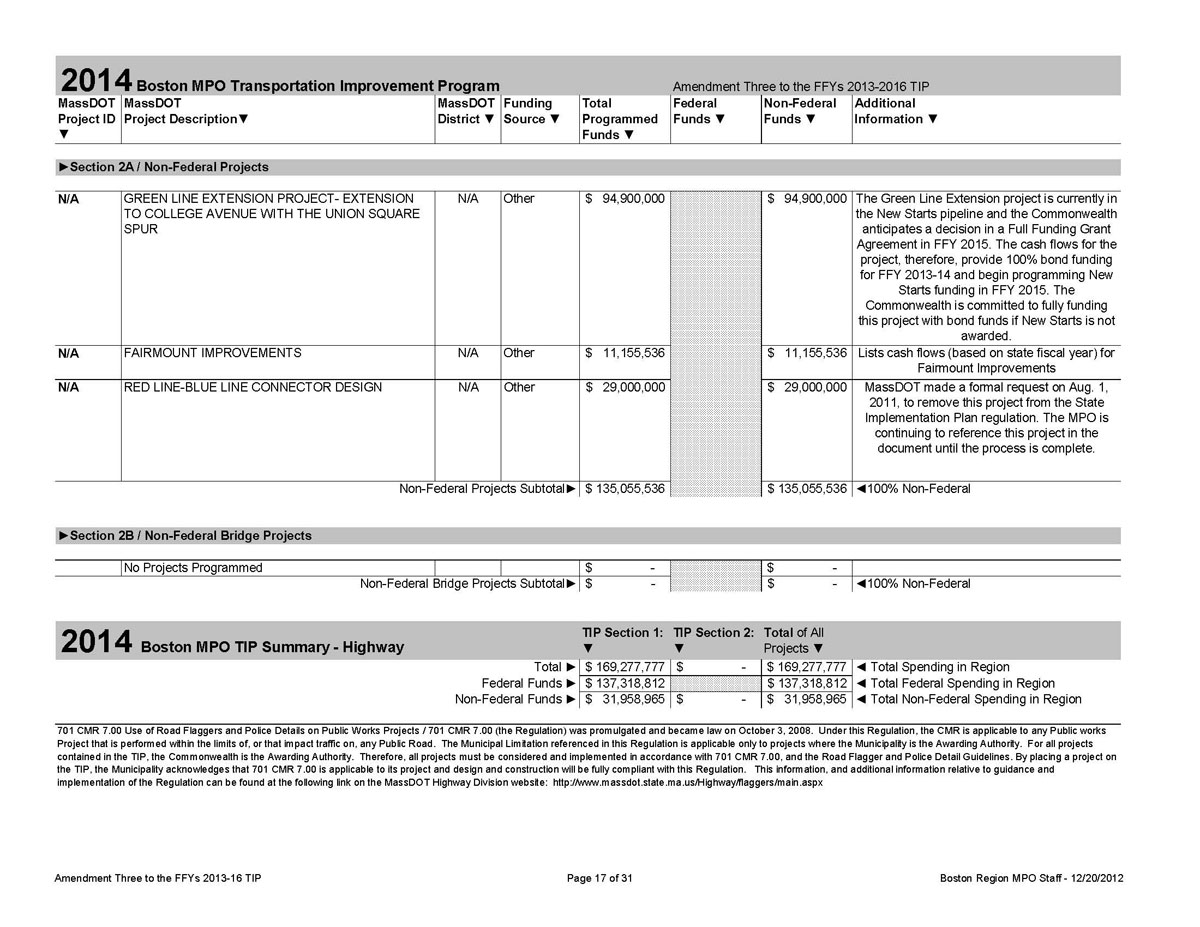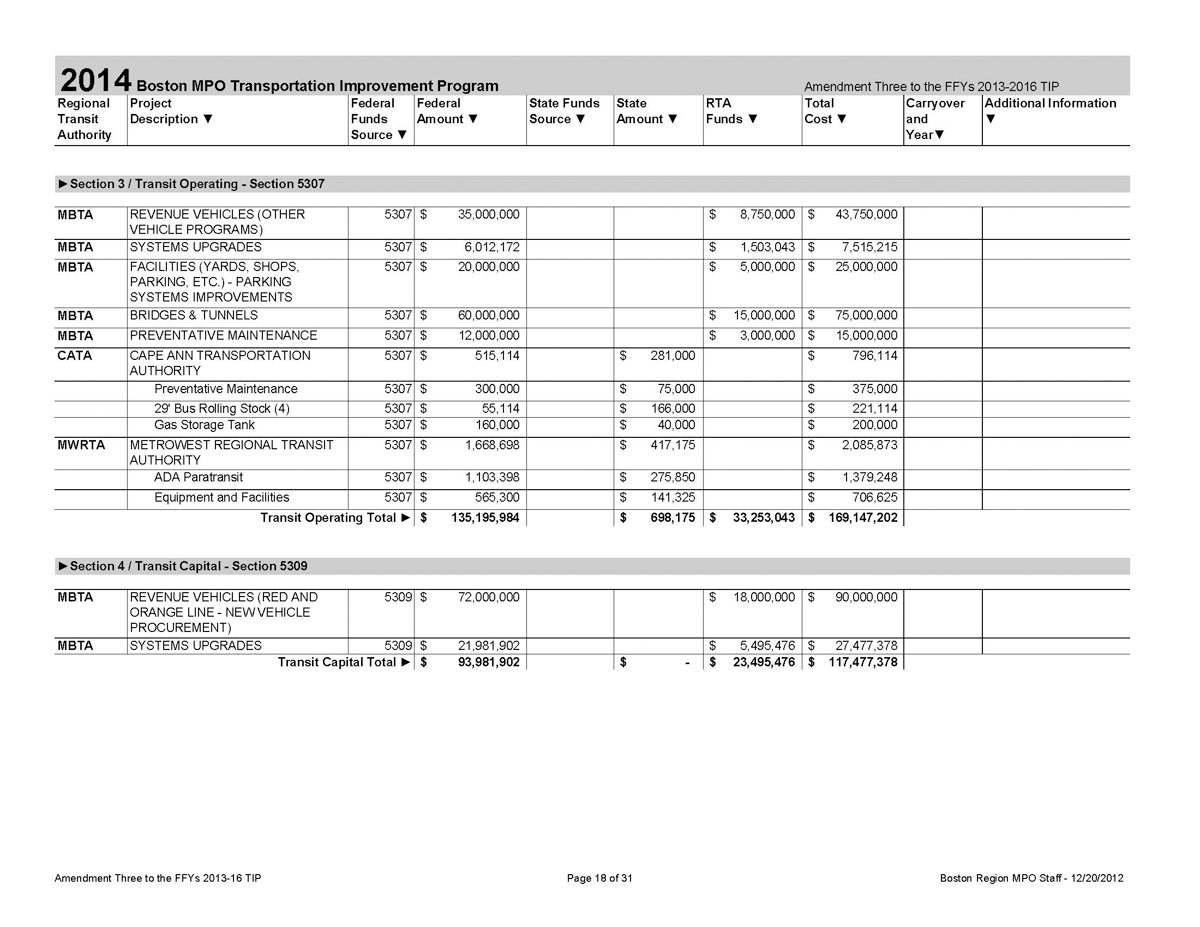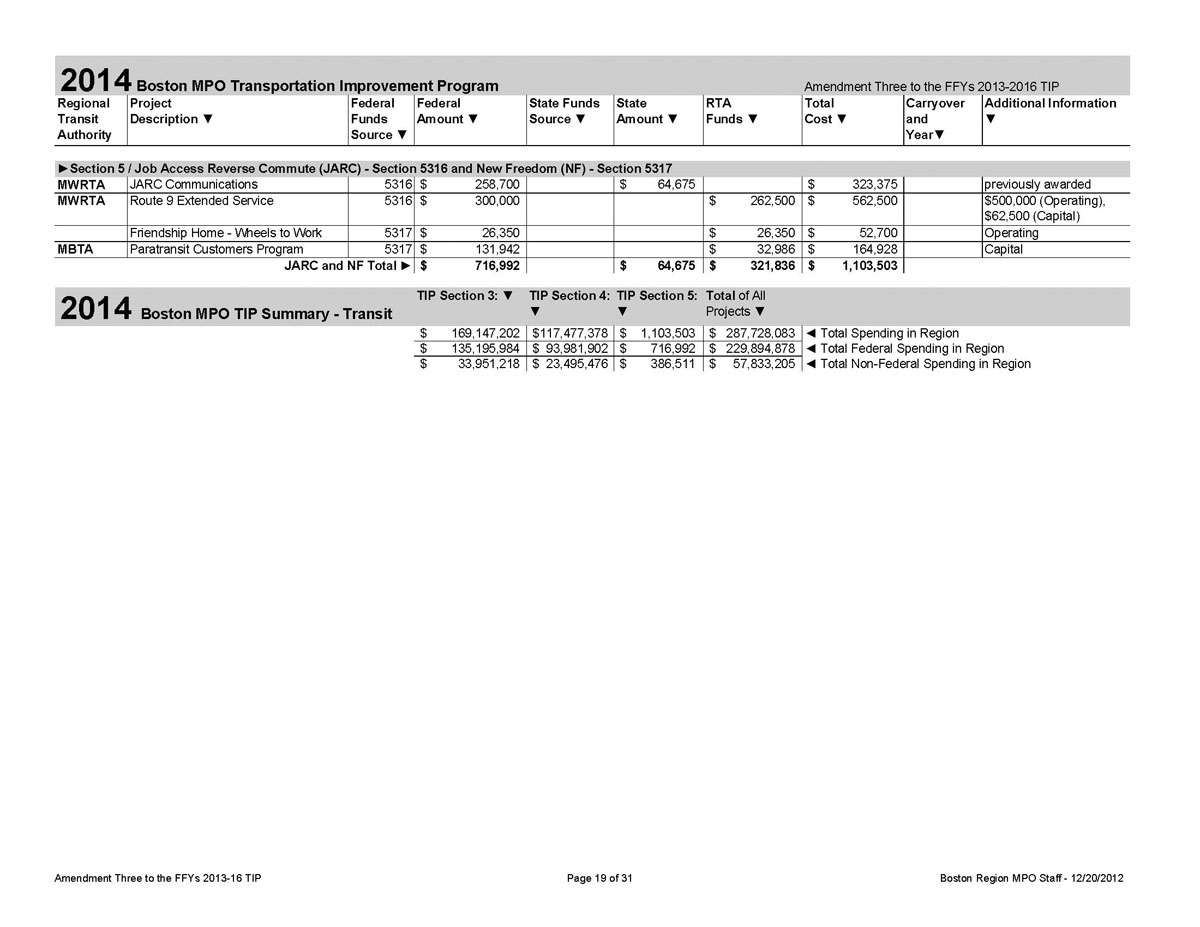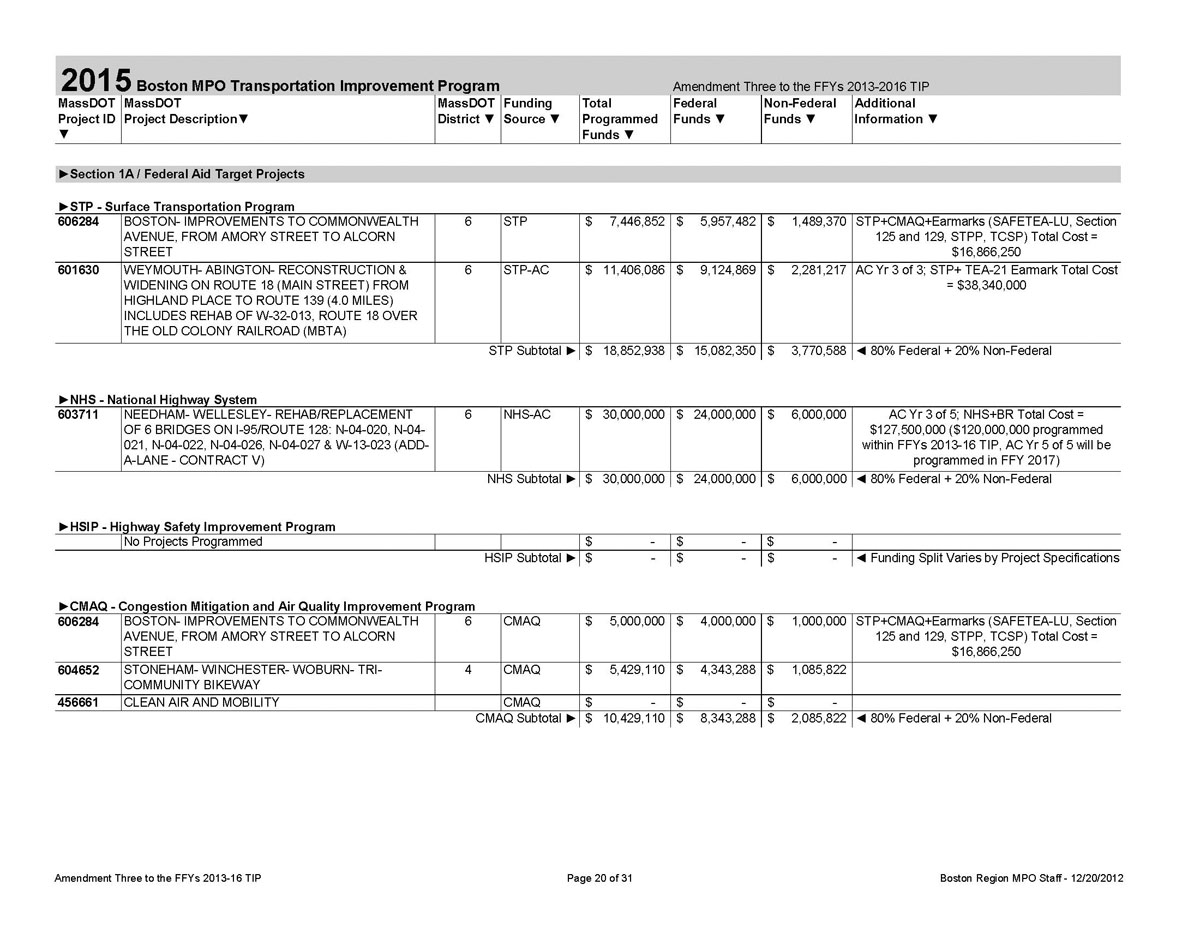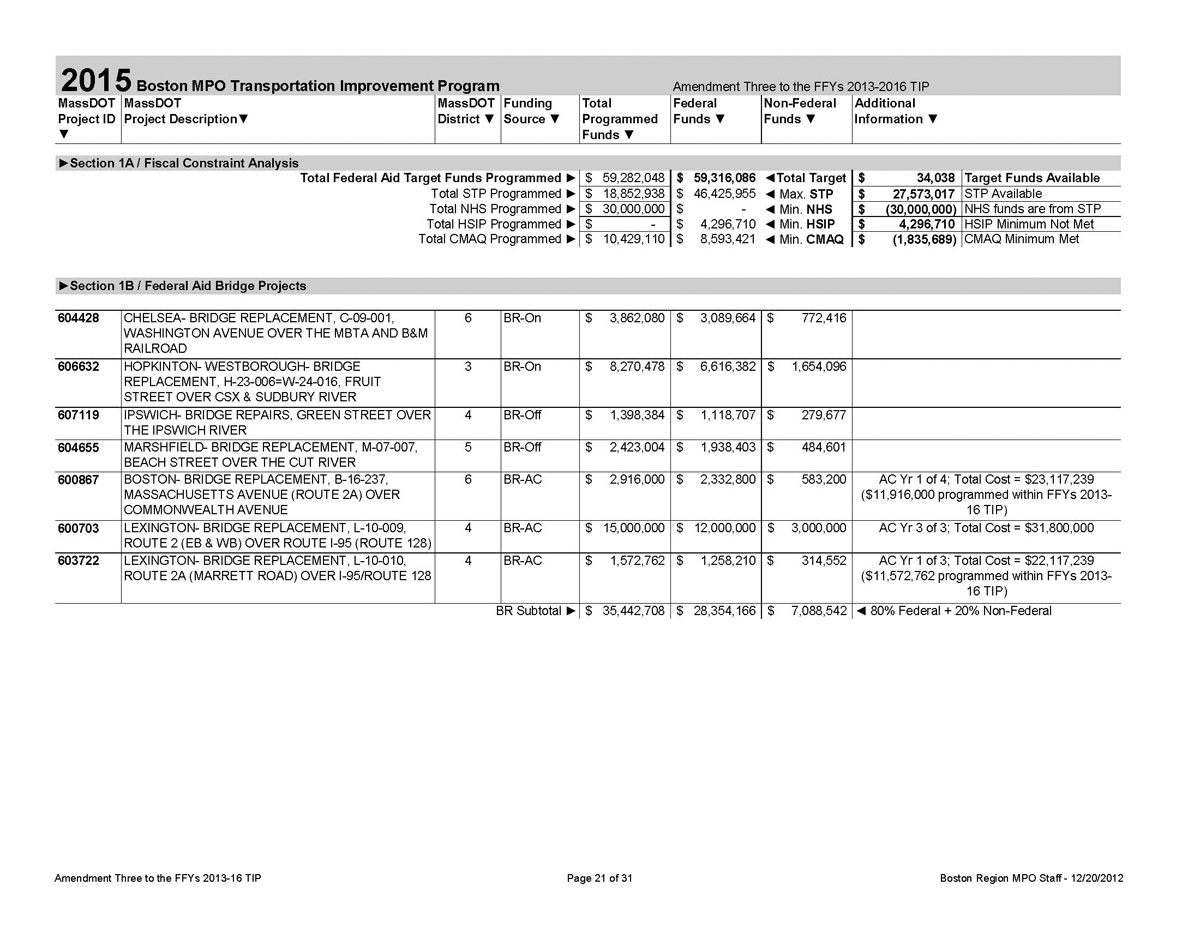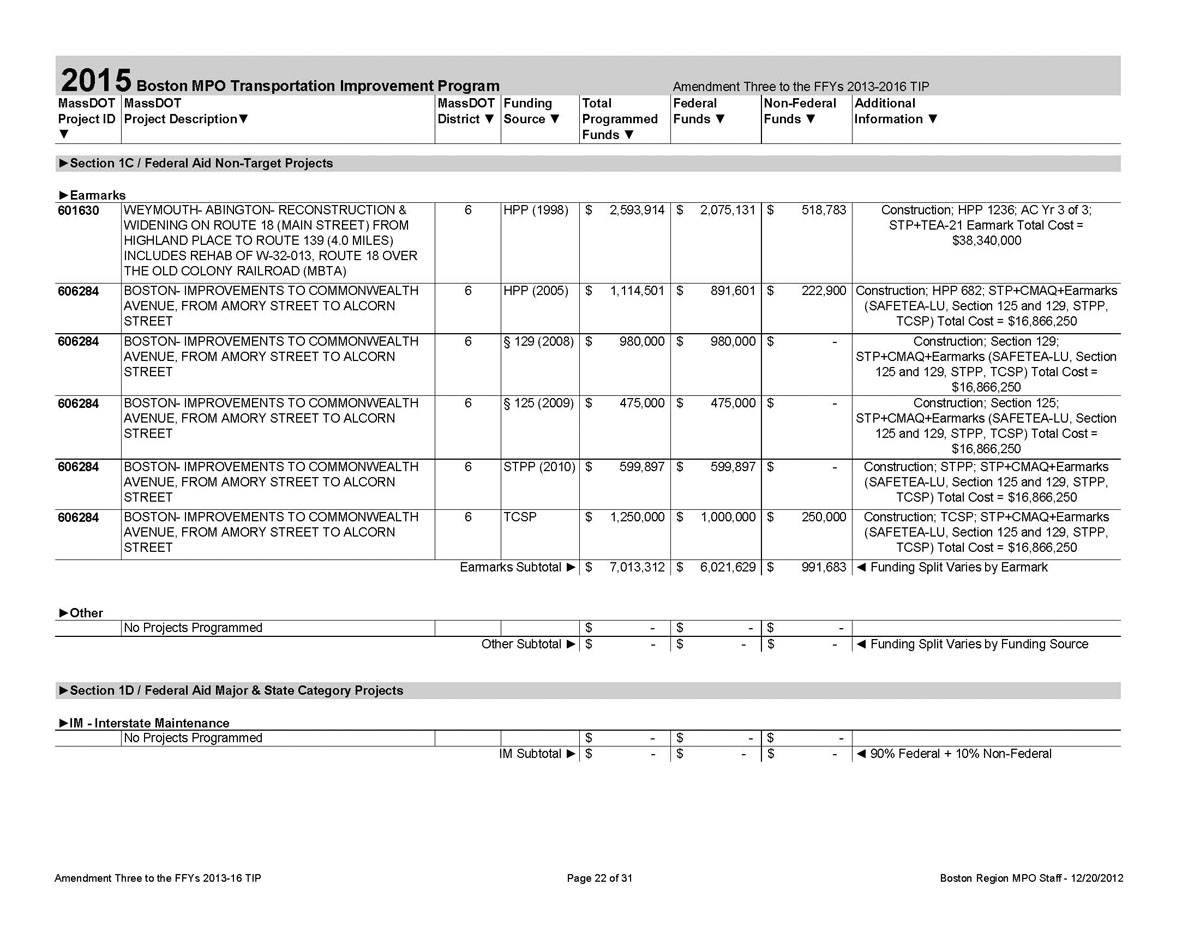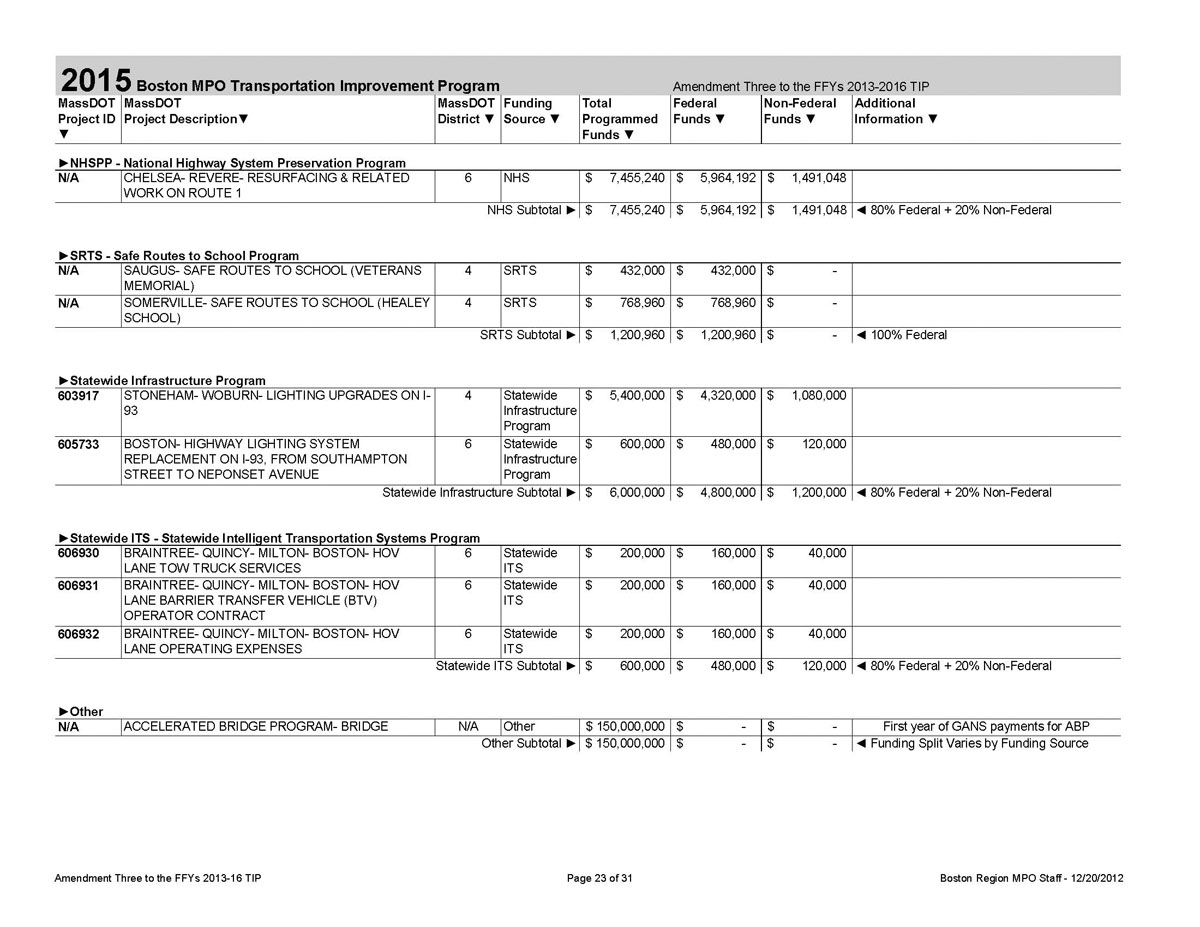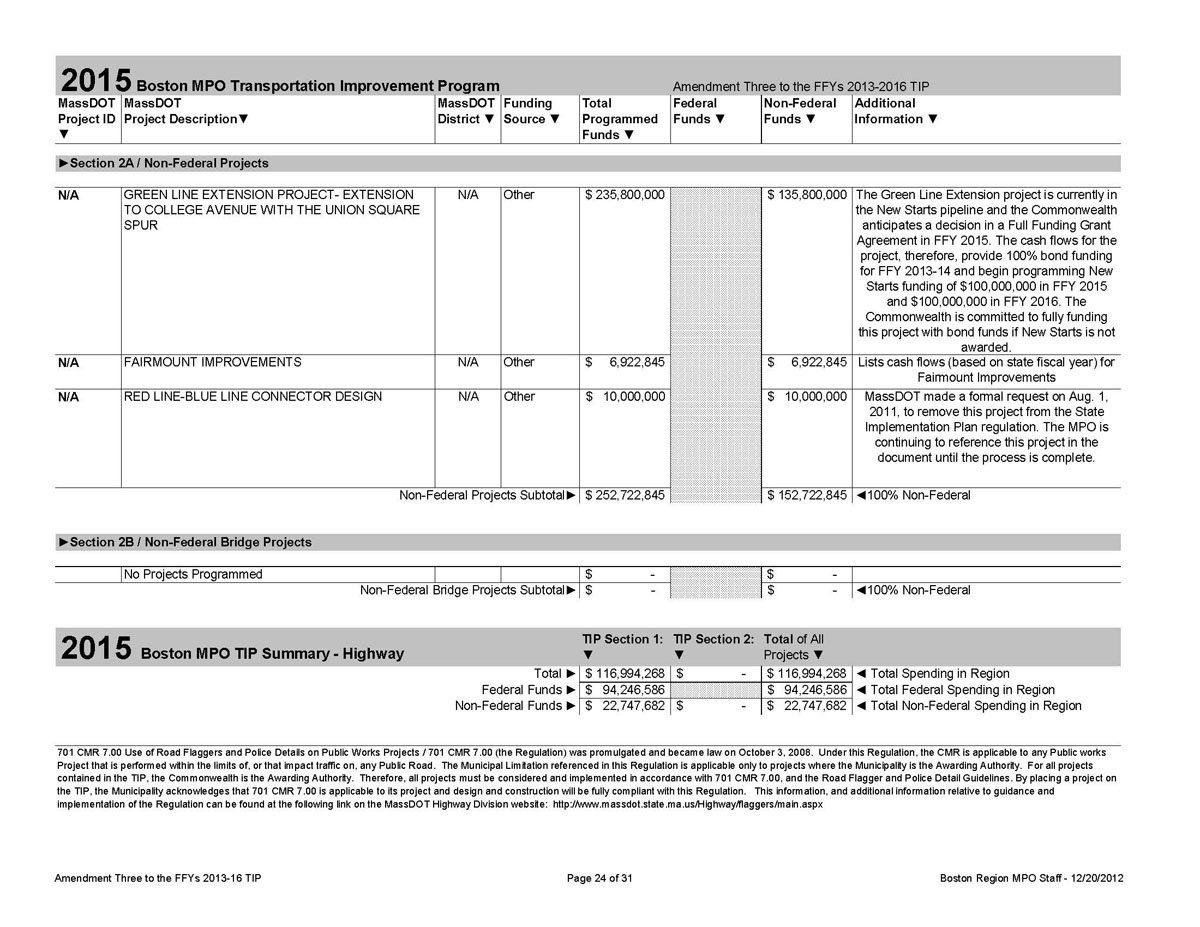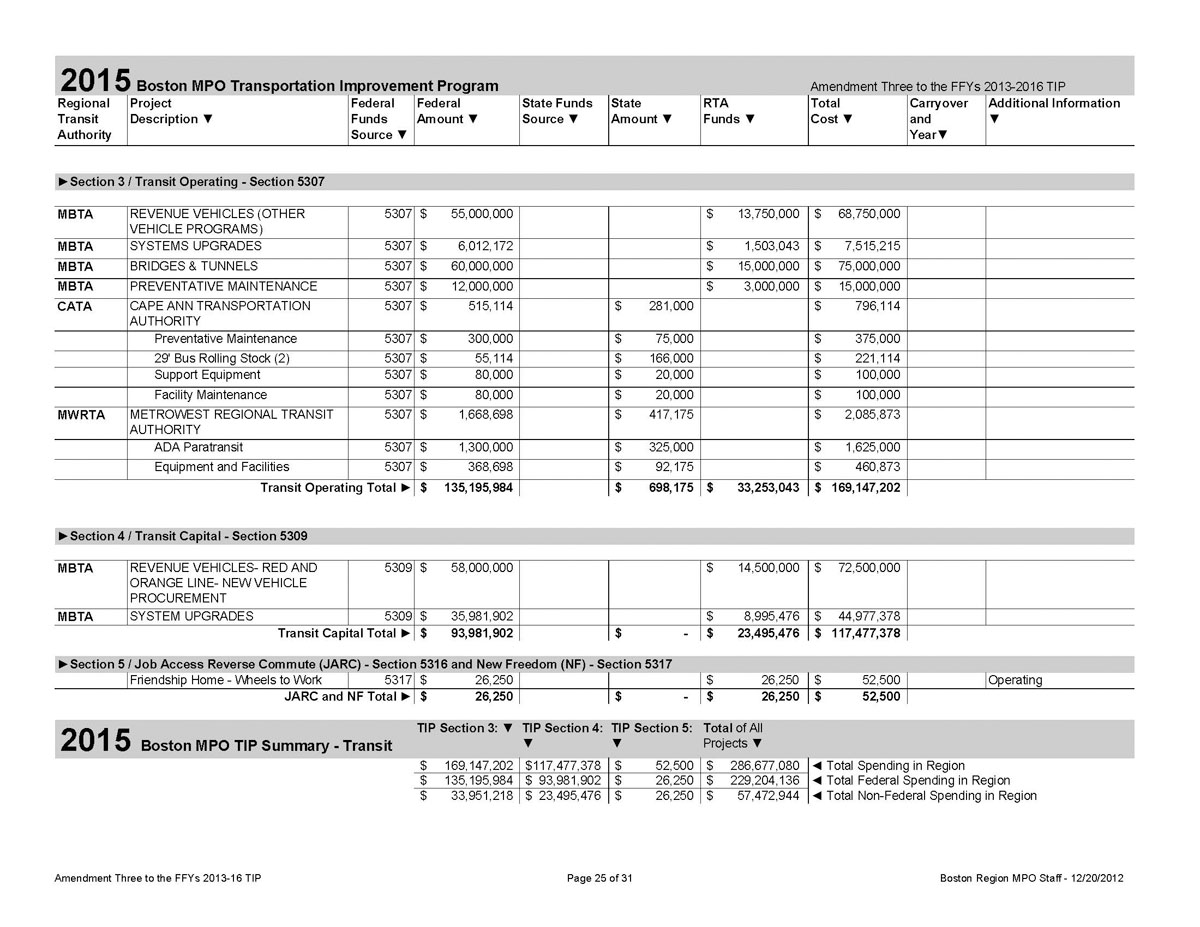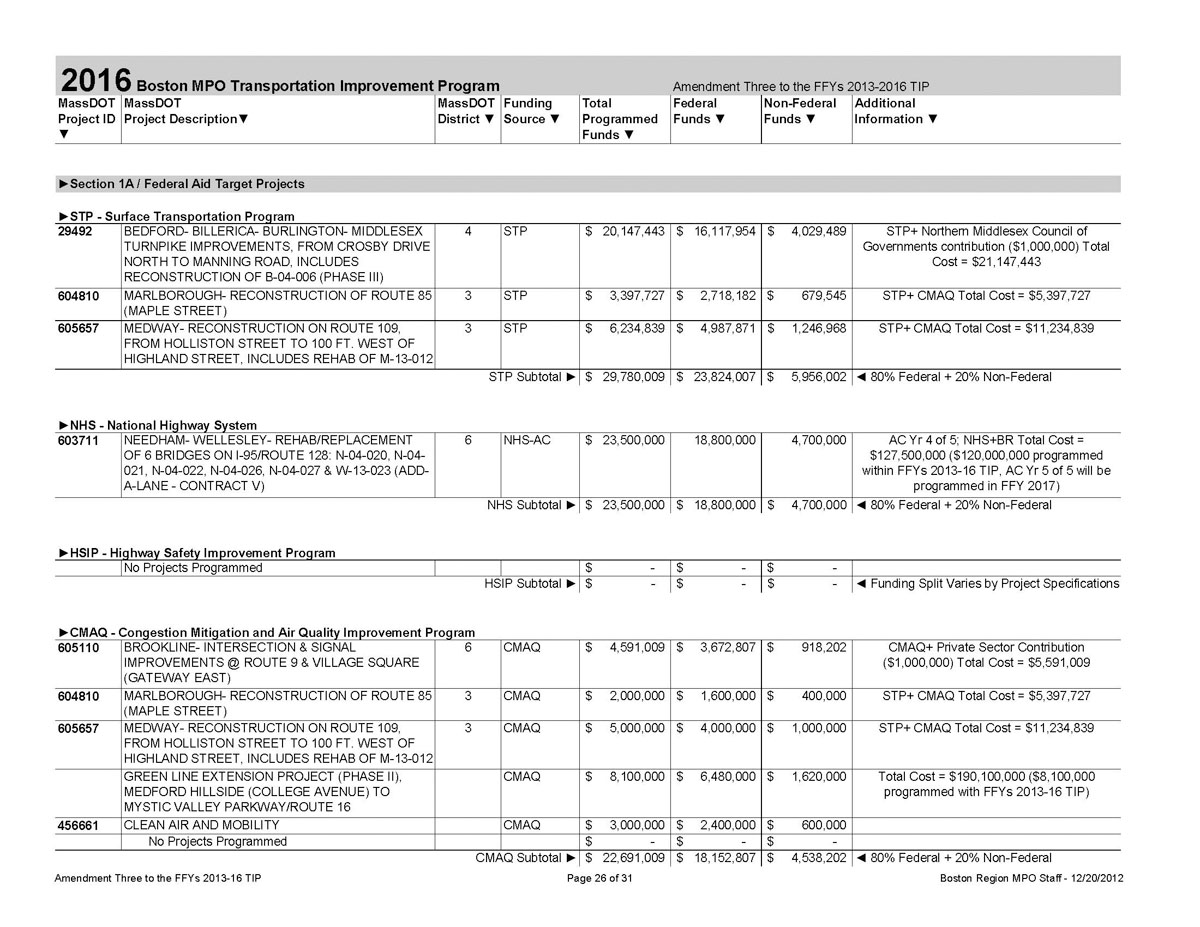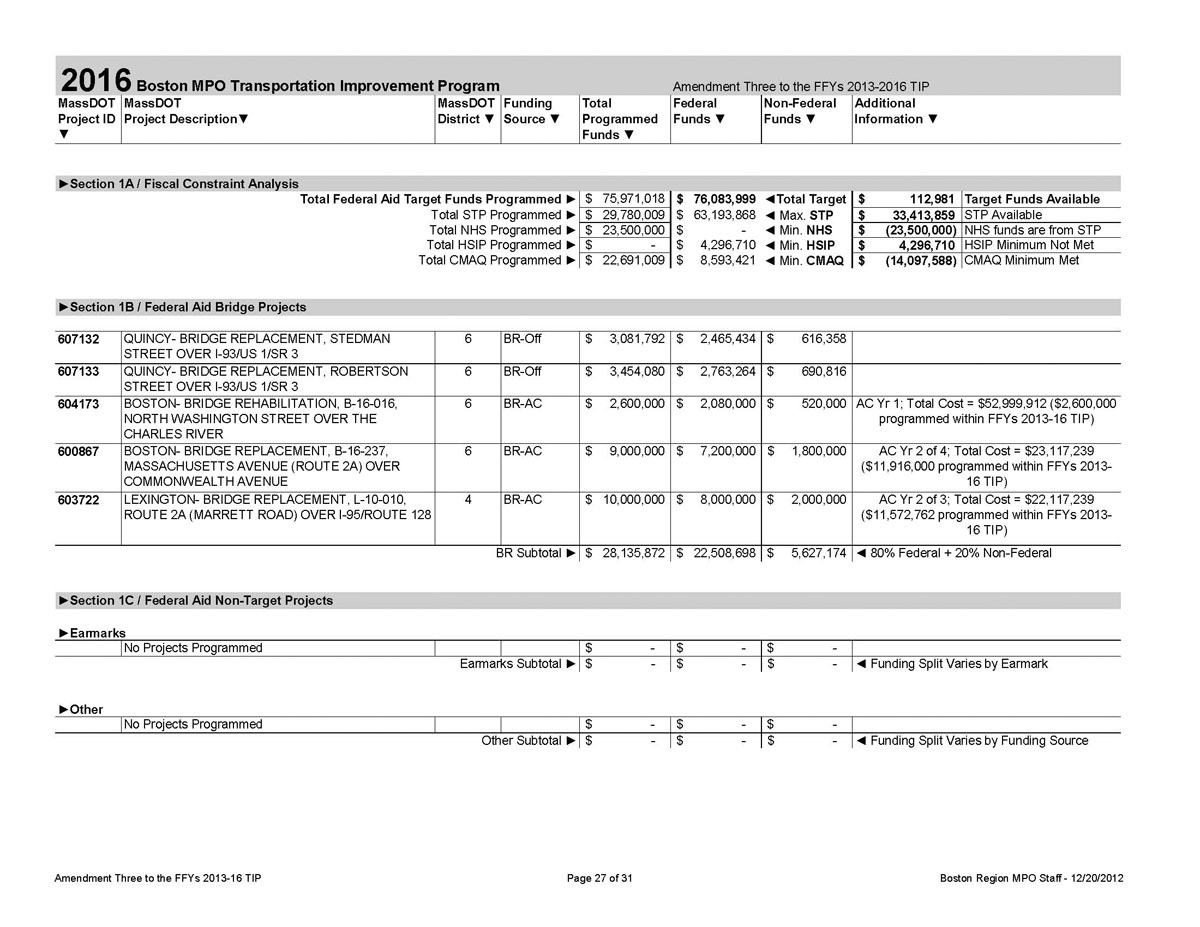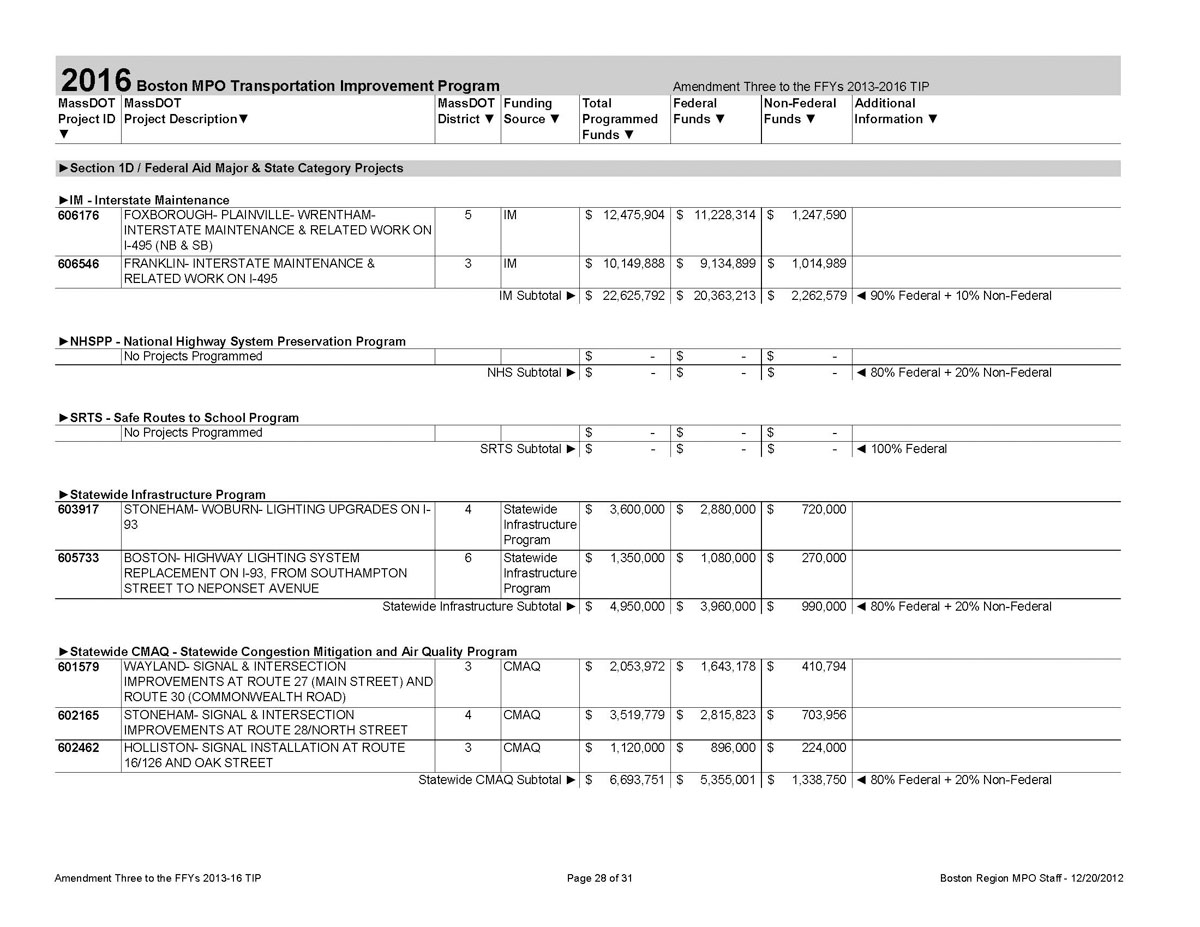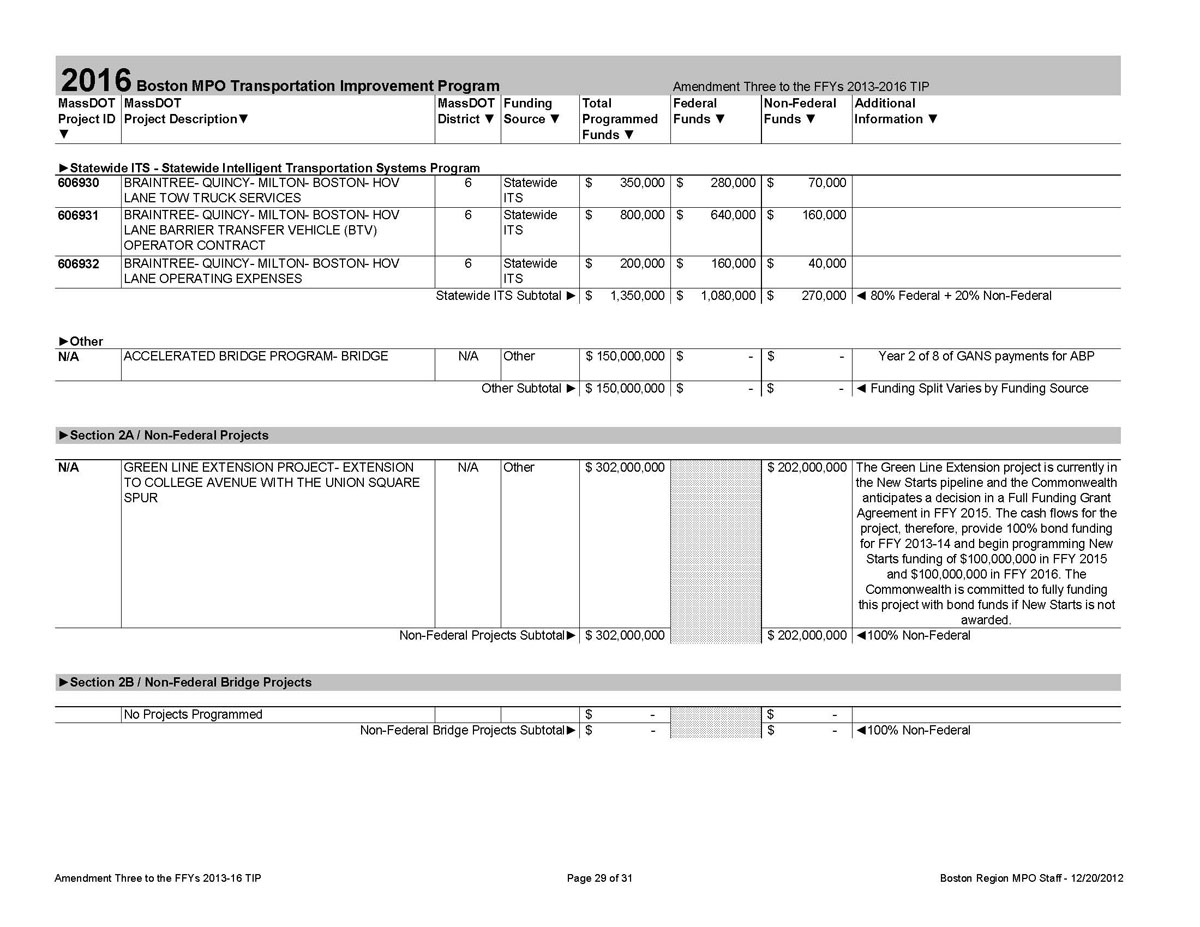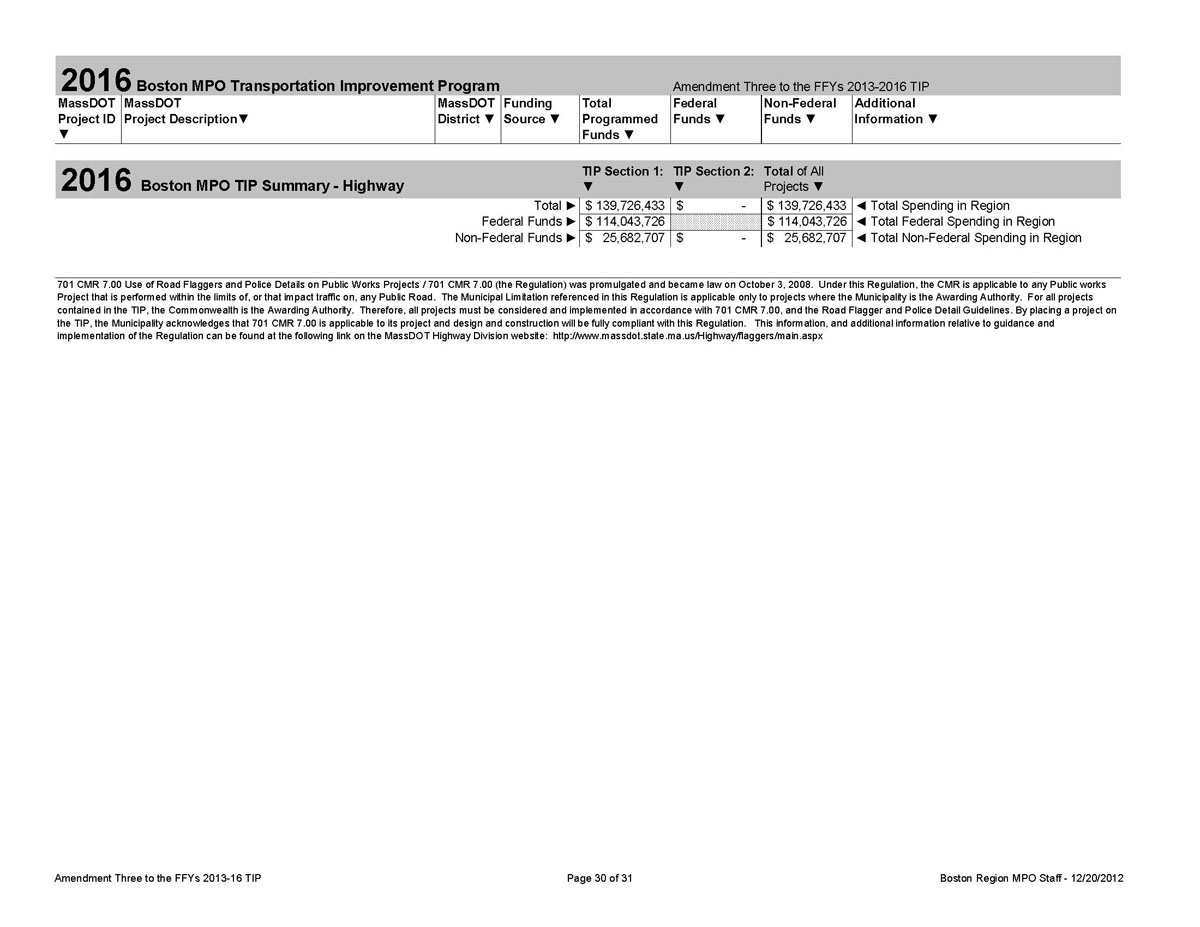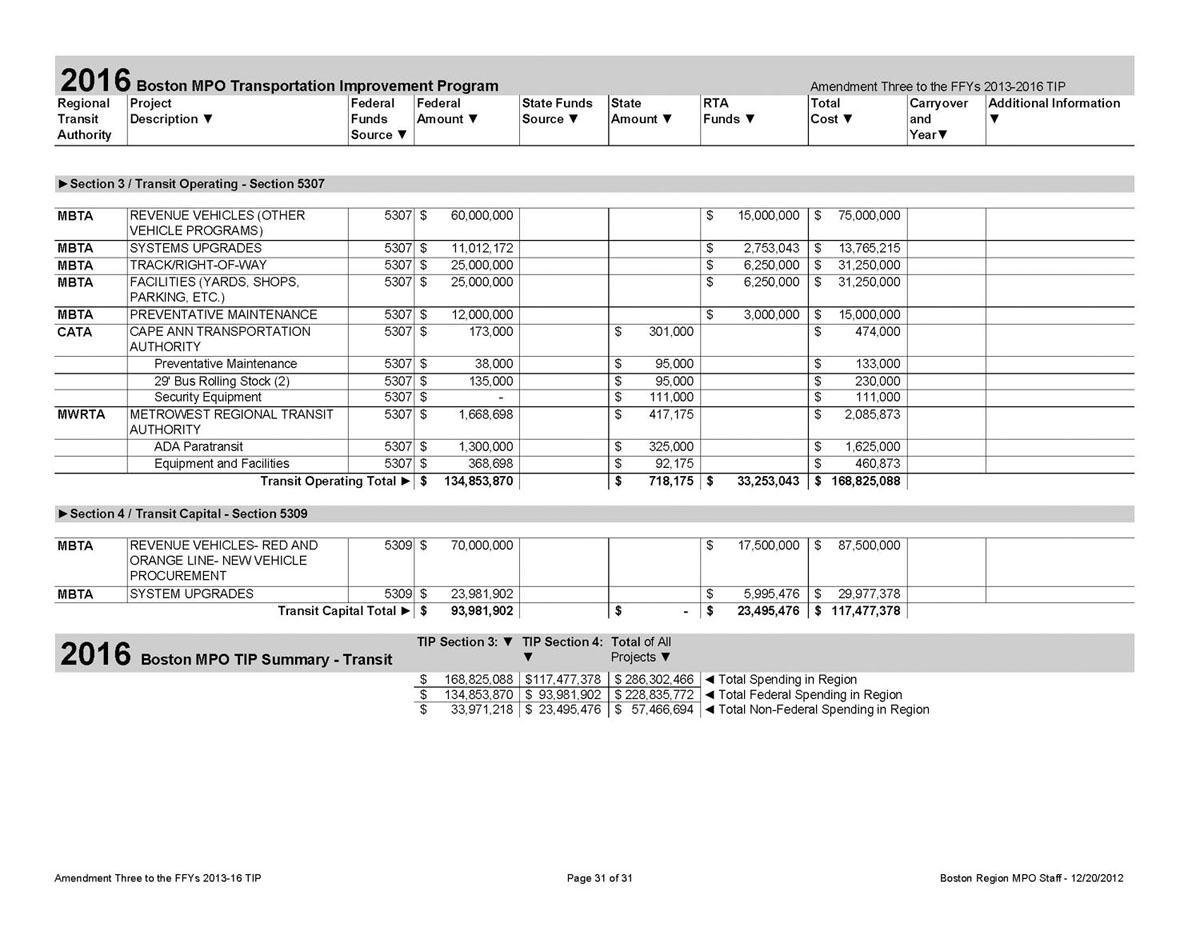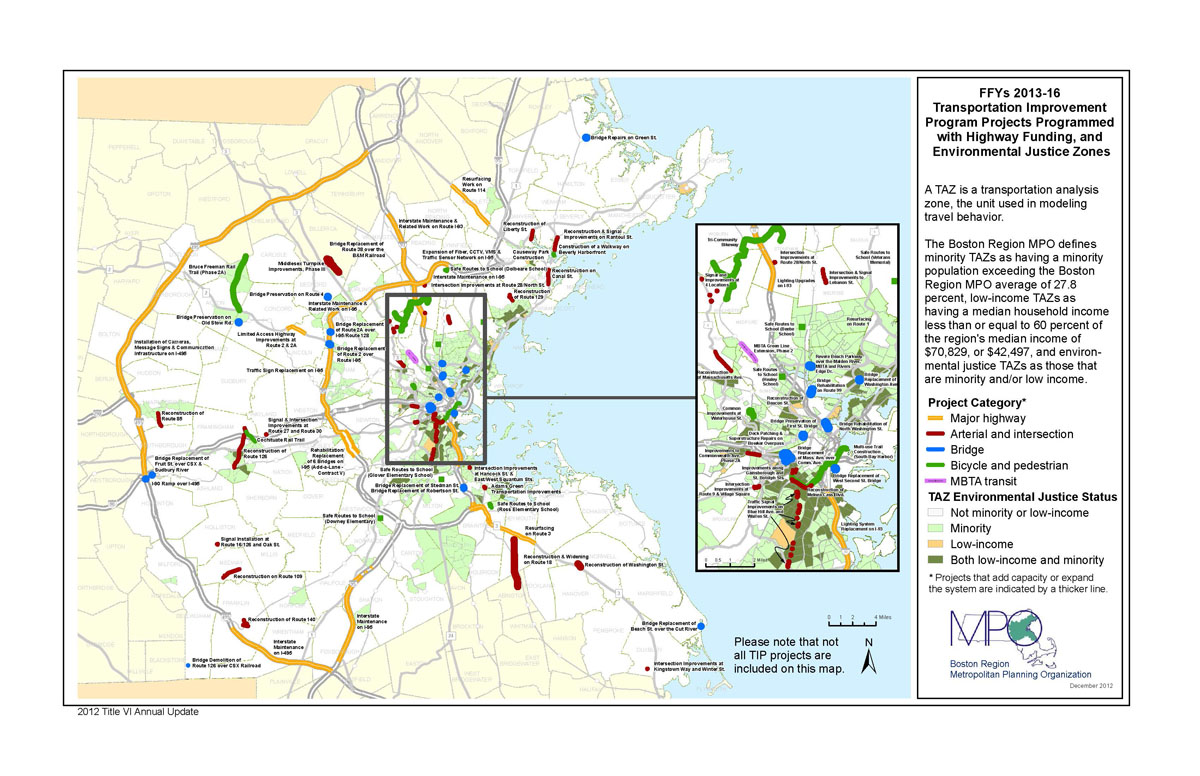![The MPO’s signed Title VI assurances are provided beginning on page 5. (Note that these documents were provided by the Federal Transit Administration [FTA] and MassDOT and are not in accessible formats. If you require assistance with these documents, please contact the MPO staff at 617.973.7100 [voice], 617.973.7089 [TTY], 617.973.8855 [fax], or publicinformation@ctps.org.).](MPO_0117_Memo_TitleVI/Certs_and_Assurances_Page_01.png)
Boston Region Metropolitan Planning Organization
2012 TITLE VI ANNUAL UPDATE
to the
MASSACHUSETTS DEPARTMENT OF TRANSPORTATION
January 17, 2013
Title VI of the Civil Rights Act of 1964 prohibits discrimination on the basis of race, color, or national origin in programs and activities receiving federal financial assistance. Two Executive Orders and related statutes further define populations that are protected under the umbrella of Title VI. Executive Order 12898 is concerned with environmental justice for minority and low-income populations. Executive Order 13166 is concerned with providing equal access to services and benefits for those individuals with limited English proficiency (LEP).
The Boston Region MPO submitted a comprehensive triennial Title VI report to MassDOT in April 2011 and a revision of that report in June 2011. This report is an annual update and follows MassDOT’s Annual Title VI Report Template of April 2011. Only the policies and activities that have changed since the January 2012 annual update are discussed. If there are no changes to present in a report section, that fact is noted.
No changes to member selection processes. The Regional Transportation Advisory Council (Advisory Council) is an independent group charged with providing public input on transportation planning to the MPO. It is composed of citizen, professional, and transportation-advocacy groups, neighboring MPOs, and agencies. The Advisory Council provides a forum for broad-based discussions of transportation issues and is a major avenue for public participation in the MPO’s planning process. As a voting member of the MPO, the Advisory Council brings the perspectives of the public to the MPO for consideration as plans and programs are developed. Individuals are welcome to participate in all meetings of the Advisory Council, but membership is limited to public and private organizations and governmental units, including state agencies and municipalities. Entities are admitted to membership by vote of the existing members. A summary of an Advisory Council self-identification survey is provided as Appendix 1. The MPO is conducting outreach to make the membership more diverse.
Alicia Wilson, Transportation Equity Manager
The MPO’s signed Title VI assurances are provided beginning on page 5. (Note that these documents were provided by the Federal Transit Administration [FTA] and MassDOT and are not in accessible formats. If you require assistance with these documents, please contact the MPO staff at 617.973.7100 [voice], 617.973.7089 [TTY], 617.973.8855 [fax], or publicinformation@ctps.org.)
The MPO has developed the following notice to the public of protection under Title VI:
The Boston Region Metropolitan Planning Organization (MPO) fully complies with Title VI of the Civil Rights Act of 1964 and related statutes and regulations in all programs and activities. The MPO does not discriminate on the basis of race, color, national origin, English proficiency, income, religious creed, ancestry, disability, age, gender, sexual orientation, gender identity or expression, or military service.Any person who believes herself/himself or any specific class of persons to have been subjected to discrimination prohibited by Title VI or related statutes or regulations may, herself/himself or via a representative, file a written complaint with the MPO. A complaint must be filed no later than 180 calendar days after the date on which the person believes the discrimination occurred. A complaint form and additional information can be obtained by contacting the MPO (see below) or at www.bostonmpo.org.
The meeting locations are accessible to people with disabilities and are near public transportation. Upon request (preferably two weeks in advance of the meeting), every effort will be made to provide accommodations such as assistive listening devices, materials in accessible formats and in languages other than English, and interpreters in American Sign Language and other languages. Please contact the MPO staff at 617.973.7100 (voice), 617.973.7089 (TTY), 617.973.8855 (fax), or publicinformation@ctps.org.
This statement is posted on the MPO’s website along with the procedures for filing a complaint and the MPO’s complaint form; all of these items are posted in both English and Spanish. Also, all public-outreach materials include the relevant portions of the statement above.
No changes.
The MPO has not received any Title VI complaints or been the subject of any Title VI lawsuits, and it has not initiated any investigations.
No major changes. The MPO’s revised website, which will go live shortly, incorporates Google Translates for those who wish to read documents in a language other than English. The MPO has developed maps showing the locations of populations with LEP and populations who speak a language other than English at home (these maps are included in the demographic profiles that will be forwarded when finalized).
No changes.
The MPO has not received any Title VI complaints.
Appendix 2 summarizes the projects in the 2013–16 Transportation Improvement Program (TIP) and indicates their specific funding sources. In addition, the map shows the locations of highway funded projects and the environmental justice transportation analysis zones in the MPO region.
The MPO has no enhancement projects.
![The MPO’s signed Title VI assurances are provided beginning on page 5. (Note that these documents were provided by the Federal Transit Administration [FTA] and MassDOT and are not in accessible formats. If you require assistance with these documents, please contact the MPO staff at 617.973.7100 [voice], 617.973.7089 [TTY], 617.973.8855 [fax], or publicinformation@ctps.org.).](MPO_0117_Memo_TitleVI/Certs_and_Assurances_Page_01.png)
![The MPO’s signed Title VI assurances are provided beginning on page 5. (Note that these documents were provided by the Federal Transit Administration [FTA] and MassDOT and are not in accessible formats. If you require assistance with these documents, please contact the MPO staff at 617.973.7100 [voice], 617.973.7089 [TTY], 617.973.8855 [fax], or publicinformation@ctps.org.).](MPO_0117_Memo_TitleVI/Certs_and_Assurances_Page_02.png)
![The MPO’s signed Title VI assurances are provided beginning on page 5. (Note that these documents were provided by the Federal Transit Administration [FTA] and MassDOT and are not in accessible formats. If you require assistance with these documents, please contact the MPO staff at 617.973.7100 [voice], 617.973.7089 [TTY], 617.973.8855 [fax], or publicinformation@ctps.org.).](MPO_0117_Memo_TitleVI/Certs_and_Assurances_Page_03.jpg)
![The MPO’s signed Title VI assurances are provided beginning on page 5. (Note that these documents were provided by the Federal Transit Administration [FTA] and MassDOT and are not in accessible formats. If you require assistance with these documents, please contact the MPO staff at 617.973.7100 [voice], 617.973.7089 [TTY], 617.973.8855 [fax], or publicinformation@ctps.org.).](MPO_0117_Memo_TitleVI/Certs_and_Assurances_Page_4.jpg)
![The MPO’s signed Title VI assurances are provided beginning on page 5. (Note that these documents were provided by the Federal Transit Administration [FTA] and MassDOT and are not in accessible formats. If you require assistance with these documents, please contact the MPO staff at 617.973.7100 [voice], 617.973.7089 [TTY], 617.973.8855 [fax], or publicinformation@ctps.org.).](MPO_0117_Memo_TitleVI/Certs_and_Assurances_Page_05.png)
![The MPO’s signed Title VI assurances are provided beginning on page 5. (Note that these documents were provided by the Federal Transit Administration [FTA] and MassDOT and are not in accessible formats. If you require assistance with these documents, please contact the MPO staff at 617.973.7100 [voice], 617.973.7089 [TTY], 617.973.8855 [fax], or publicinformation@ctps.org.).](MPO_0117_Memo_TitleVI/Certs_and_Assurances_Page_06.png)
![The MPO’s signed Title VI assurances are provided beginning on page 5. (Note that these documents were provided by the Federal Transit Administration [FTA] and MassDOT and are not in accessible formats. If you require assistance with these documents, please contact the MPO staff at 617.973.7100 [voice], 617.973.7089 [TTY], 617.973.8855 [fax], or publicinformation@ctps.org.).](MPO_0117_Memo_TitleVI/Certs_and_Assurances_Page_07.png)
![The MPO’s signed Title VI assurances are provided beginning on page 5. (Note that these documents were provided by the Federal Transit Administration [FTA] and MassDOT and are not in accessible formats. If you require assistance with these documents, please contact the MPO staff at 617.973.7100 [voice], 617.973.7089 [TTY], 617.973.8855 [fax], or publicinformation@ctps.org.).](MPO_0117_Memo_TitleVI/Certs_and_Assurances_Page_08.png)
![The MPO’s signed Title VI assurances are provided beginning on page 5. (Note that these documents were provided by the Federal Transit Administration [FTA] and MassDOT and are not in accessible formats. If you require assistance with these documents, please contact the MPO staff at 617.973.7100 [voice], 617.973.7089 [TTY], 617.973.8855 [fax], or publicinformation@ctps.org.).](MPO_0117_Memo_TitleVI/Certs_and_Assurances_Page_09.png)
![The MPO’s signed Title VI assurances are provided beginning on page 5. (Note that these documents were provided by the Federal Transit Administration [FTA] and MassDOT and are not in accessible formats. If you require assistance with these documents, please contact the MPO staff at 617.973.7100 [voice], 617.973.7089 [TTY], 617.973.8855 [fax], or publicinformation@ctps.org.).](MPO_0117_Memo_TitleVI/Certs_and_Assurances_Page_10.png)
![The MPO’s signed Title VI assurances are provided beginning on page 5. (Note that these documents were provided by the Federal Transit Administration [FTA] and MassDOT and are not in accessible formats. If you require assistance with these documents, please contact the MPO staff at 617.973.7100 [voice], 617.973.7089 [TTY], 617.973.8855 [fax], or publicinformation@ctps.org.).](MPO_0117_Memo_TitleVI/Certs_and_Assurances_Page_11.png)
![The MPO’s signed Title VI assurances are provided beginning on page 5. (Note that these documents were provided by the Federal Transit Administration [FTA] and MassDOT and are not in accessible formats. If you require assistance with these documents, please contact the MPO staff at 617.973.7100 [voice], 617.973.7089 [TTY], 617.973.8855 [fax], or publicinformation@ctps.org.).](MPO_0117_Memo_TitleVI/Certs_and_Assurances_Page_12.png)
![The MPO’s signed Title VI assurances are provided beginning on page 5. (Note that these documents were provided by the Federal Transit Administration [FTA] and MassDOT and are not in accessible formats. If you require assistance with these documents, please contact the MPO staff at 617.973.7100 [voice], 617.973.7089 [TTY], 617.973.8855 [fax], or publicinformation@ctps.org.).](MPO_0117_Memo_TitleVI/Certs_and_Assurances_Page_13.png)
![The MPO’s signed Title VI assurances are provided beginning on page 5. (Note that these documents were provided by the Federal Transit Administration [FTA] and MassDOT and are not in accessible formats. If you require assistance with these documents, please contact the MPO staff at 617.973.7100 [voice], 617.973.7089 [TTY], 617.973.8855 [fax], or publicinformation@ctps.org.).](MPO_0117_Memo_TitleVI/Certs_and_Assurances_Page_14.png)
![The MPO’s signed Title VI assurances are provided beginning on page 5. (Note that these documents were provided by the Federal Transit Administration [FTA] and MassDOT and are not in accessible formats. If you require assistance with these documents, please contact the MPO staff at 617.973.7100 [voice], 617.973.7089 [TTY], 617.973.8855 [fax], or publicinformation@ctps.org.).](MPO_0117_Memo_TitleVI/Certs_and_Assurances_Page_15.png)
No changes.
No changes.
No major changes. The Transportation Equity Survey continues to be posted on the MPO website. Additional comments have been received since the last comment summary. The MPO has expanded the list of organizations to be contacted in its outreach program. In order to identify additional organizations to include in its outreach and consultations, the MPO is surveying local officials in municipalities with transportation analysis zones that meet the MPO criteria for environmental justice areas.
No changes.
None. The MPO has no fiduciary authority.
No changes.
No changes.
No changes.
The MPO has produced new demographic profiles of the region using 2010 Census data and 2006–10 American Community Survey data. They will be forwarded when finalized.
No changes.
No changes.
No changes.
No changes in general. The MPO has made plans for conducting outreach activities in 2013.
The following describes the MPO’s recently completed projects, current work, and upcoming initiatives in the federal fiscal year (FFY) 2013 Unified Planning Work Program (UPWP) that provide data collection and analysis supportive of MPO coordination of environmental justice (EJ) issues or help in addressing the transportation needs of minority, LEP, and low-income residents.
The primary purpose of this ongoing project is to integrate EJ issues and concerns into MPO planning and programming activities and support development of the Long-Range Transportation Plan (LRTP), UPWP, TIP, Congestion Management Process (CMP), air quality conformity determinations, and project-specific work products. Another purpose is to foster awareness of the MPO in EJ populations and to facilitate their participation in MPO planning and programming. This has been done through continued outreach to minority, LEP, and low-income populations.
Many MPO-recommended proposals for the Federal Transit Administration’s (FTA’s) Job Access and Reverse Commute (JARC) and New Freedom grant programs were funded during the last four years. These proposals include: conducting studies on how to facilitate coordination of existing transportation resources, identifying resource gaps and developing strategies for closing them, enhancing consumers’ abilities to access and use transportation options, and planning for and operating paratransit.
The MPO conducted analysis to help determine which of these projects were effective and will use this information to recommend future projects, to encourage the use of best practices, and to update the Coordinated Public-Transit Human Services Transportation Plan. A draft memo documenting the analysis has been produced. A copy of the memo will be forwarded to MassDOT when it is finalized.
Using the latest mapping software and data, CTPS is in the process of creating a neighborhood map showing streets, street names, building footprints, points of interest, and MBTA bus routes for each MBTA station. Each map has a “You Are Here” designation at the station location, as well as a quarter-mile-radius ring depicting the distance of a 5-to-10-minute walk from the station.
When the MWRTA was established, the MPO conducted a study that explored potential markets and provided service planning assistance. As the MWRTA enters its fifth year of service, it could benefit from an evaluation of route efficiencies and demands. In federal fiscal year 2013, the MPO will evaluate existing transit service, identify potential improvements to present routes and schedules, and propose new services to meet untapped demand and relieve traffic congestion.
The MPO supports the MBTA in meeting ADA requirements by providing ongoing support to the Access Advisory Committee to the MBTA (AACT), a user group representing people with disabilities. AACT advises the MBTA on all accessibility matters relating to the use of the MBTA’s systemwide fixed-route services and THE RIDE paratransit service by people with disabilities and ensures that users’ ideas and concerns about accessible transportation in the region are heard.
One requirement of the 1990 Americans with Disabilities Act (ADA) is that government agency material that is distributed to the public be made available in accessible formats, in a timely manner, upon request. The MPO fulfills this requirement. Beginning in 2012, the MPO has adopted a practice of providing materials prepared for the MPO that are posted on the MPO website in PDF and HTML formats so that they can be read by contemporary screen reader technology. In addition to providing materials in accessible formats, the MPO has developed accessibility standards and guidelines for the conduct of MPO-sponsored meetings.
Corridor analysis is a logical way to approach transportation studies in the region. Possible corridors of critical and strategic concern might best be viewed in a programmatic way. An arterial management/roadway improvement effort will recommend conceptual improvements for corridors that the CMP and the LRTP identified as part of the needs assessment process. A particular corridor or several sections of multiple corridors could be selected. Fifteen candidate locations are included in the FFY 2013 UPWP. Seven of the 15 corridors are either entirely or partially in communities with MPO-defined environmental justice areas. The Route 203 corridor in Boston was studied in FFY 2012. This corridor runs through an MPO EJ area.
In 2010, the MPO completed a database of transportation services available to elderly residents in each community in the region. The database, available to the public on the MPO website, is currently being updated.
In 2012, MAPC worked with the Nuestra ComunidadDevelopment Corporation in Roxbury to identify potential improvements to the Warren Street corridor, based on numerous previous transportation studies of the area. The work focused on how transportation improvements could support redevelopment of underutilized parcels along the corridor.
MAPC presented at and helped facilitate a workshop in the Dudley Square neighborhood of Roxbury on July 14, 2012, for identifying improvements that could help create complete streets and safer intersection crossings in the area. MAPC worked with Renaissance Consulting Group to present information on the neighborhood and plans that have been completed for the area over the last 10 years. Attendees conducted a field walk and worked together to identify ways to improve transit, walking, and biking in the area.
MAPC has been working with the communities of Chelsea, Everett, Malden, Medford, and Somerville to create a network of safe and well-signed walking routes to the lower Mystic River and its tributaries (Chelsea Creek, Mill Creek, and the Malden River). The work program identified key implementation links and assisted the communities in finalizing the network vision. http://www.mapc.org/smart-growth/environment/mystic-river
MAPC is working in Malden, Everett, Chelsea, Revere, Lynn, and Saugus to identify easily implementable bicycle and pedestrian infrastructure improvements. As part of the planning effort, existing conditions and potential opportunities will be identified for each area. The planning effort will identify priority connections and routes for each of the communities, including proposed bicycle and pedestrian accommodations, produce cross-sections of the major collector roads in the communities, and identify opportunities to help fund implementation. The proposed accommodations could include exclusive bicycle lanes, sharrows, cycle tracks, new sidewalks, and improved surface conditions. At the conclusion of the planning effort, it will be the responsibility of the individual municipalities to implement the recommendations.
In Quincy, MAPC is working to identify the potential for transit-oriented development (TOD) around the Wollaston MBTA station on the Red Line. It is analyzing the area to identify potential impediments to development, such as existing zoning, inadequate pedestrian connections, parking challenges, and other infrastructure elements, and will offer recommendations on how to improve the site’s potential for TOD. MAPC is working closely with the MBTA, property owners, and the City of Quincy.
Staff kicked off the station area TOD planning effort in the Wollaston neighborhood on November 29, 2012, with a public meeting where they presented the project, provided background information on the area, and asked meeting participants to talk about how and where new development could be accommodated in the neighborhood. The meeting engaged about 80 participants in facilitated small-group dialogue. MAPC staff will be using this input to create a scenario for future investment in the area as well as recommendations for changes to land use, zoning, transportation access and safety; they will conduct market analyses to support their recommendations. Outreach focused on engaging the Asian community in the neighborhood through the Asian Community Development Corporation.
MAPC has been working with the cities of Boston, Cambridge, and Somerville and the Town of Brookline on implementation of the regional Hubway bike share system. In the summer of 2011, Boston launched a 600-bicycle, 60-station system, which expanded into neighboring municipalities in 2012. Funding for the program comes from the Boston Region MPO’s Clean Air and Mobility Program, a separate FTA Bus Livability award, and from the municipalities.
Through funding from the Barr Foundation, MAPC is working with the municipalities to create a $5 annual Hubway membership for low-income participants. MAPC is also researching strategies to increase Hubway ridership in low-income and low-education-level communities and developing partnerships with community-based agencies to host focus groups and distribute information about Hubway. The Barr Foundation is also funding several Hubway stations that will continue to grow the program further into environmental justice communities in Boston.
In 2011, MAPC finalized its State of Equity report, which is the first report in its Regional Indicators program. This document establishes a baseline for MAPC’s equity-related indicators; the program will track the region’s progress toward the MetroFuture goals. http://regionalindicators.org/
In 2012, MAPC used this information to support community outreach efforts to engage more groups that are traditionally not involved in the regional planning process. Metropolitan planning funds were used to support outreach efforts for the Fairmount/Indigo Corridor Planning Initiative and the Fairmount Greenway Initiative, twin transit-oriented development projects that focus on historically EJ communities in Boston. MAPC is working with the Boston Redevelopment Authority, Community Development Corporations, and community-based coalitions, playing a critical role in the outreach to and engagement of residents. In November 2012, approximately 250 people from the neighborhoods participated in a community planning charrette.
MAPC will work closely with the City of Boston to study the potential for redevelopment of the Sullivan Square area into a transit-oriented, mixed-use center that will better connect the transit station to residential neighborhoods in Charlestown and interconnect existing and new open spaces. This Boston neighborhood includes MPO-identified EJ TAZs. The land use planning study and rezoning also aim to support the further development of a multimodal MBTA station at Sullivan Square that includes a commuter rail stop and future Urban Ring connections. As a corollary to the creation of a new street grid and development parcels, the study aims to enhance the public realm by creating public sidewalks, new open spaces, and an appropriate mix and scale of residential and commercial development with active ground-floor uses. The transportation elements of this project are programmed in the LRTP in the 2016–20 time period.
MEMORANDUM
DATE November 26, 2012
TO Boston Region MPO Files
FROM Alicia Wilson, MPO Staff
RE Regional Transportation Advisory Council
Self-Identification Survey
The Regional Transportation Advisory Council (Advisory Council) is an independent group charged with providing public input on transportation planning to the Boston Region MPO. It is composed of citizen, professional, and transportation-advocacy groups, neighboring MPOs, and agencies. The Advisory Council provides a forum for broad-based discussions of transportation issues and is a major avenue for public participation in the MPO’s planning process. As a voting member of the MPO, the Advisory Council brings the perspectives of the public to the MPO for consideration as plans and programs are developed. Individuals are welcome to participate in all meetings of the Advisory Council, but membership is limited to public and private organizations and governmental units, including state agencies and municipalities. Entities are admitted to membership by vote of the existing members. MPO members (including cities, towns, and agencies) are nonvoting members of the Advisory Council.
In September 2012, the MPO asked the Advisory Council to conduct an anonymous self-identification survey of its voting members. The intent of the survey was to gather race, ethnicity, and language data to satisfy federal Title VI information requirements, as requested in the MPO’s most recent federal recertification review. The survey also collected data on household income.
A survey form was given to each of the 45 current voting members of the Advisory Council. Thirty-four survey forms were returned to the MPO, representing a 75.6% response rate. The following is a summary of the survey results.
Table 1 compares the races/ethnicities of the responding Advisory Council members with those of the MPO region’s population overall. As shown, the Advisory Council members are more likely to be non-minorities than the MPO population in general.
Table 1 |
||
Race/Ethnicity* |
Advisory Council |
Boston Region MPO |
White |
88.2% |
72.2% |
Black/African American |
5.9% |
7.9% |
Asian/Pacific Islander |
0.0% |
7.5% |
Hispanic |
2.9% |
9.1% |
Other |
0.0% |
3.2% |
No response |
2.9% |
NA |
Total |
100.0% |
100.0% |
*Hispanics can belong to any racial group, but they are given a separate category in this analysis.
Eighty-five percent (30) of the responding Advisory Council members speak English at home versus 76% of the MPO population (the MPO language data are for persons five and older). Of the four respondees who indicated that they speak one or more languages other than English at home, one did not indicate which language is spoken. The languages spoken by the other three respondees are Arabic, French, and French and Spanish.
The MPO’s definition of a low-income household is one whose annual income is $42,497 or less. This threshold is equivalent to 60% of the MPO median household income of $70,829. One respondent indicated that his/her household income meets the low-income criterion. Approximately 88% of the respondents have incomes greater than $60,000.
AW/aw
